 11/03/2009 22:52 11/03/2009 22:52 |
|
| | | OFFLINE | Post: 116 | Registrato il: 28/05/2007
| Utente Junior | |
|
I read the letter at work today. It's wonderful. Very sweet, brilliant and humble.
Sadly, it won't get much attention in Germany at the moment, considering the horrific events which took place near Stuttgart today.
Just terrible.
![[SM=g27813]](https://im0.freeforumzone.it/up/0/13/5117592.gif) |
|
 12/03/2009 00:34 12/03/2009 00:34 |
|
| | | OFFLINE | | Post: 16.797 | Registrato il: 28/08/2005
| Utente Gold | |
|
OREMUS PRO PONTEFICE NOSTRO
The Holy Father requests the prayers of all the faithful so that the Lord may illumine the road for the Church. May the commitment of Pastors and the faithful grow, in support of the delicate and weighty mission of the Successor of the Apostle Peter as 'the guardian of unity' in the Church.
- Vatican Note, Feb. 4, 2009
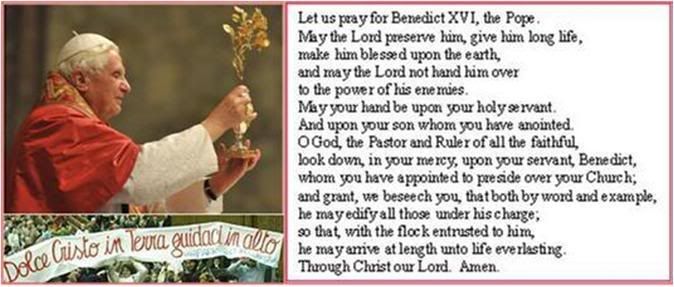
 In reply to a number of messages from new users (as well as a few veteran users but non-members) about the 'difficulty' of navigating within the Forum, I hope this helps:
In reply to a number of messages from new users (as well as a few veteran users but non-members) about the 'difficulty' of navigating within the Forum, I hope this helps:
FOR NEW VISITORS TO THE FORUM: To navigate within the page you are now on, scroll up or down as needed.
To see preceding entries in NEWS ABOUT BENEDICT, Click on 'Previous page', above right.
To get to other topic threads of the English section, click on the 'envelop' above right, tagged 'Fans speaking English' -
it will get you to the board with all the topic threads available in the section.
On that board, to get to the latest page containing the most recent entries on the topic you choose,
click on 'Last' in the parentheses indicating page numbers right after the subject title,
Once you get to that page, proceed as above.

 THE GENERAL AUDIENCE TODAY
THE GENERAL AUDIENCE TODAY
Resuming his teaching cycle today on the great medieval Christian writers of the East and West, here is how the Holy Father synthesized his catechesis in English:
In our catechesis on the early Christian writers of East and West, we now turn to Saint Boniface, the Apostle of the Germans.
Born in England and baptized with the name Winfred, he embraced the monastic life and was ordained a priest. Despite his promise as a scholar, he sensed the call to proclaim the Gospel to the pagans of the Continent.
After an initial setback, he visited Rome and was charged by Pope Gregory II with the mission to evangelize the Germanic peoples. Taking the name Boniface, he worked tirelessly for the spread of the faith and the promotion of Christian morality, established bishoprics and monasteries throughout northern Europe, and contributed in no small way to the growth of a Christian culture.
He crowned his witness to Christ by a martyr’s death, and was buried in the great monastery of Fulda.
Saint Boniface continues to inspire us by his example of missionary zeal, his complete fidelity to the word of God and the integrity of the Catholic faith, his strong sense of communion with the Apostolic See, and his efforts to promote the fruitful encounter of Germanic culture with the Roman-Christian heritage.
After he had delivered his greetings to the faithful in various languages, the Pope issued a special appeal against the apparent resurgence of terrorism in Northern Ireland:
It was with deep sorrow that I learned of the murders of two young British soldiers and a policeman in Northern Ireland.
As I assure the families of the victims and the injured of my spiritual closeness, I condemn in the strongest terms these abominable acts of terrorism which, apart from desecrating human life, seriously endanger the ongoing peace process in Northern Ireland and risk destroying the great hopes generated by this process in the region and throughout the world.
I ask the Lord that no one will again give in to the horrendous temptation of violence and that all will increase their efforts to continue building – through the patient effort of dialogue – a peaceful, just and reconciled society.
Flag-waving Cameroonians gave the Pope an advance 'welcome' today in anticipation of his trip to Cameroon..
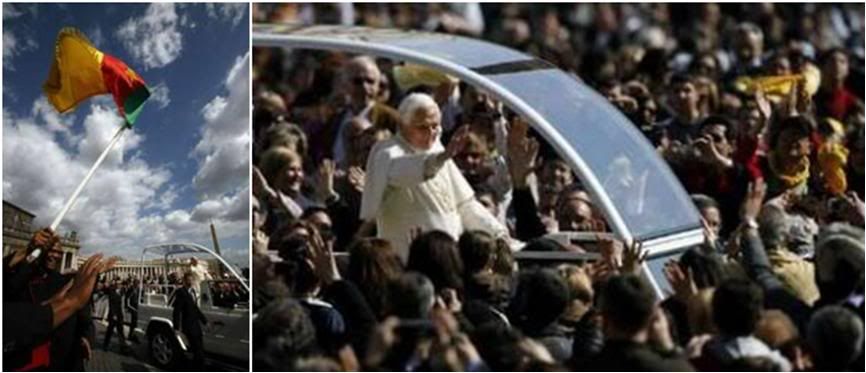
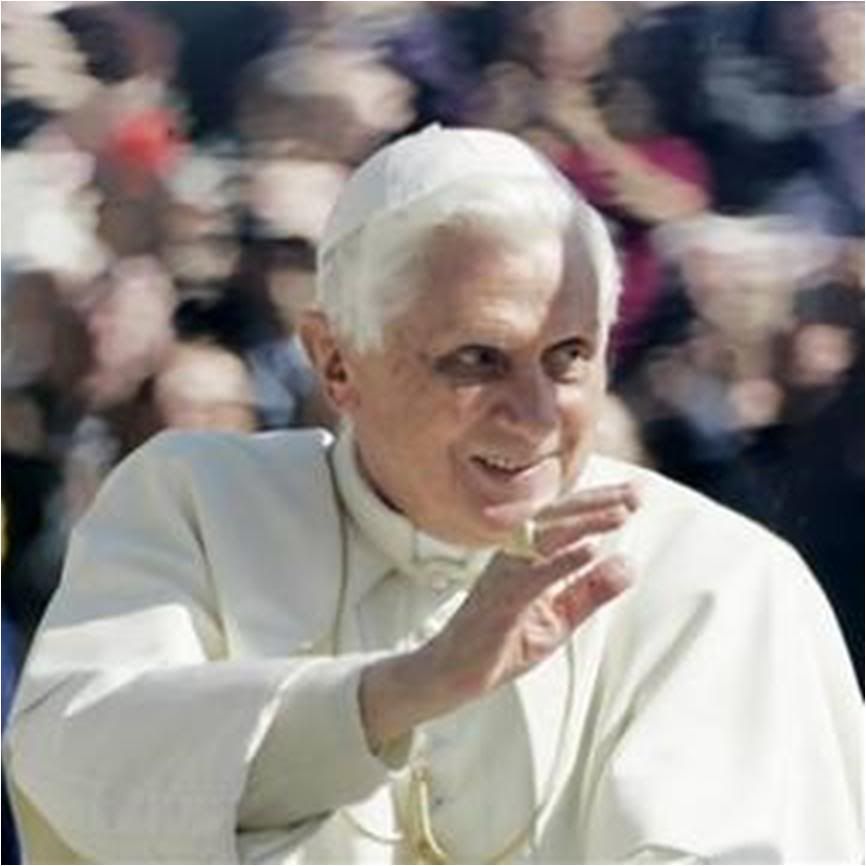
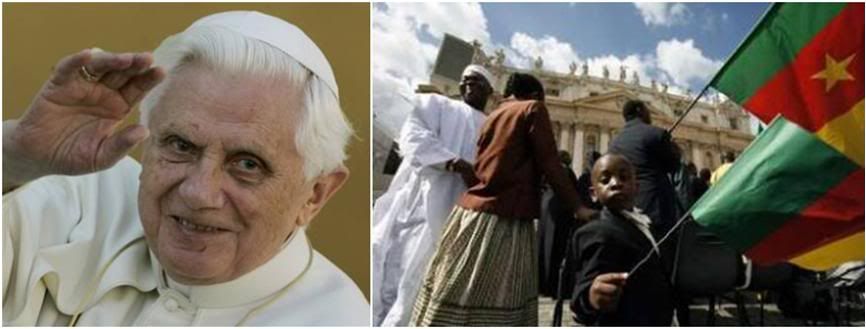
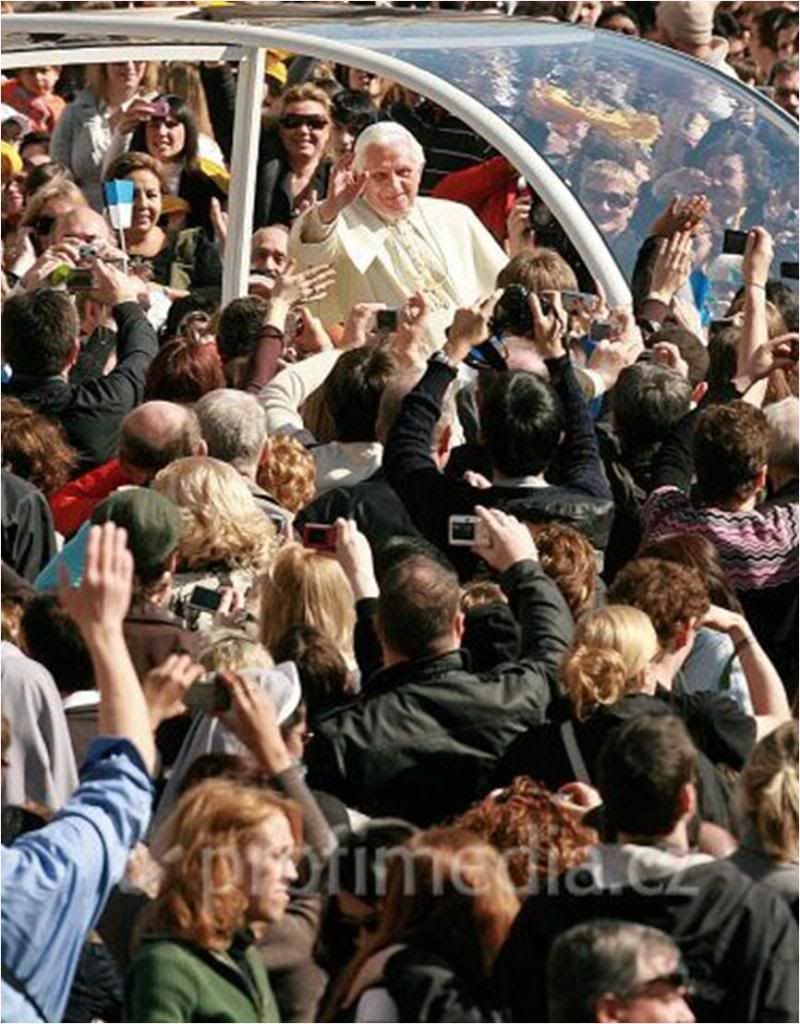
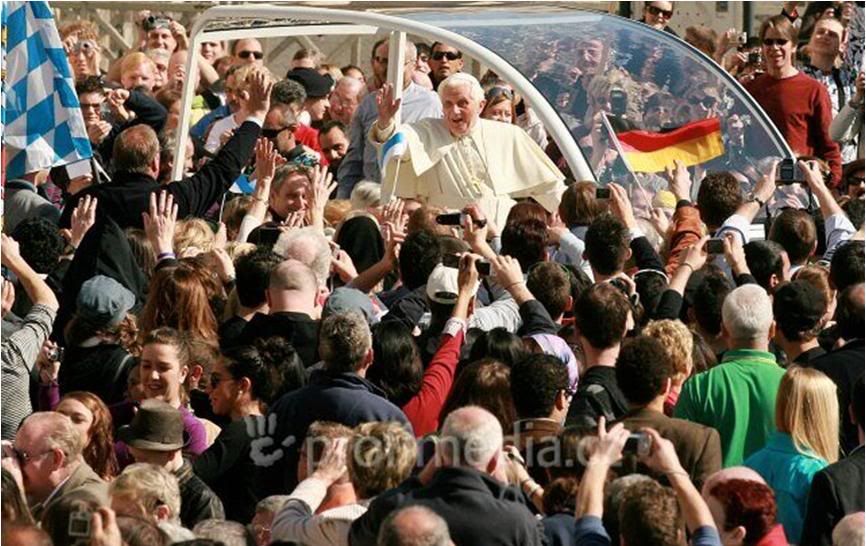
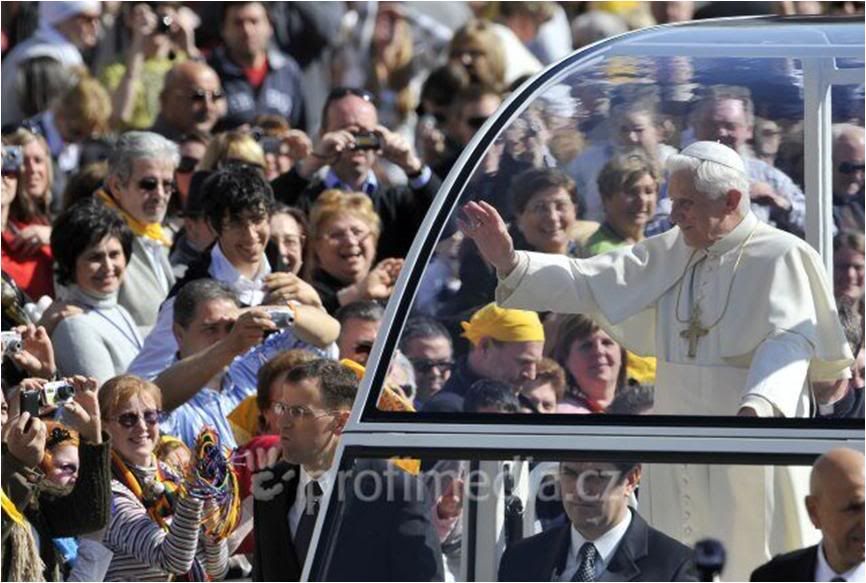
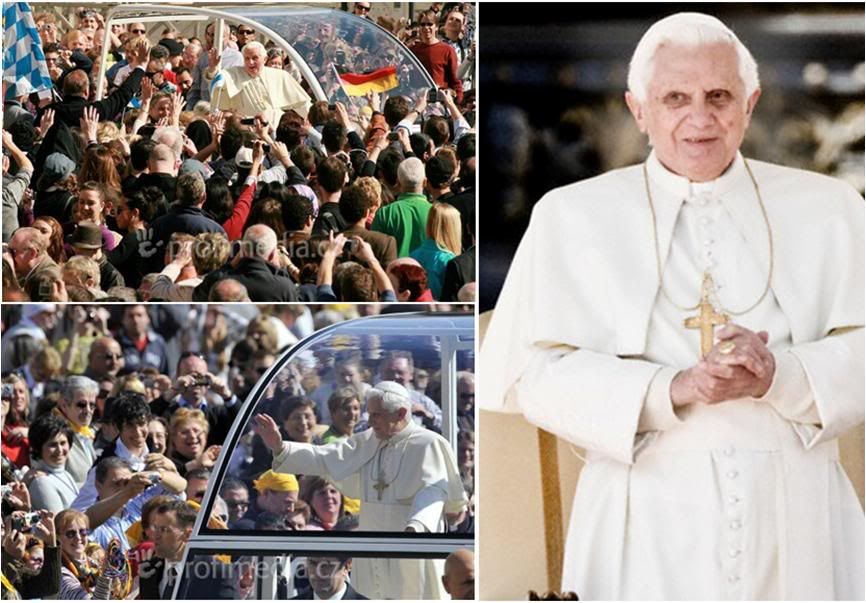 Here is a translation of the Holy Father's catechesis:
Here is a translation of the Holy Father's catechesis:
CATECHESIS ON ST. BONIFACE,
APOSTLE OF THE GERMANS
Today we will dwell on a great missionary of the eighth century who spread Christianity in central Europe, in my own country precisely - St. Boniface, who is known in history as the Apostle of the Germans.
We have much information about his life, thanks to the diligence of his biographers. He was born to an Anglo-Saxon family in Wessex, England, around 675, and was baptized Winfred. He entered the monastery quite young, attracted by the monastic ideal.
Possessing noteworthy intellectual capacities, he seemed headed for a tranquil and brilliant life as a scholar. He became an instructor of Latin grammar, he wrote a few tracts, and even composed poetry in Latin.
Ordained a priest when he was nearly 30, he felt called to an apostolate among the pagans of teh continent. Great Britain, his native country, had been evangelized a century earlier by Benedictine monks led by St. Augustine [of Canterbury], showed such solid faith and such ardent charity that it had been sending missionaries to Europe in order to announce the Gospel.
In 716, Winfred and some companions arrived in Frisian (today's Holland), but they met with the opposition of the local chief, and their attempt to evangelize failed.
Returning to England, he did not lose heart, and two years later, he went to Rome to speak to Pope Gregory II and get instructions. The Pope, according to one biographer, received him "with a smiling face and a very tender regard", and in the following days, held 'important conversations' with him' (Willibald, Vita S. Bonifatii, ed. Levison, pp. 13-14), and finally, after having given him the new name Boniface, officially entrusted him with the mission of preaching the Gospel among the peoples of Germany.
Comforted and sustained by the Pope's support, Boniface engaged himself in preaching the Gospel in that region, fighting pagan cultures and reinforcing the bases of human and Christian morals.
With a great sense of duty, he wrote in one of his letters: "Let us be firm in battle on the day of the Lord because days of affliction and misery are on us... We are not mute dogs, nor taciturn observers, nor mercenaries who flee before the wolves! Rather, we are diligent pastors who watch over the flock of Christ, who announce God's will to important people as well as the common people, to the rich and to the poor... in opportune times as well as inopportune..." (Epistulae, 3,352.354: MGH).
With his tireless activities, his organizational gifts, his ductile and amiable character despite his firmness, Boniface obtained great results. The Pope then "declared that he wanted to grant him episcopal honors, so that he could better correct and bring back errants to the way of truth, so he could feel sustained by the greater authority of apostolic honor and would be even better accepted by all in his office of preaching, that it was for this he was ordained to the apostolic prelature" (Otloho, Vita S. Bonifatii, ed. Levison, lib. I, p. 127).
It was the same Supreme Pontiff who consecrated Boniface 'regional bishop' - that is, for all of Germany. Boniface thereupon resumed his apostolic efforts in the territories entrusted to him, extending them to the Church of Gaul: with great prudence, he restored ecclesiastic discipline, called various synods to guarantee the authority of sacred canons, and reinforced the necessary communion with the Roman Pontiff, a point which was particularly dear to him.
Even the successors of Pope Gregory II held Boniface in the highest esteem: Gregory III named him archbishop of all the Germanic tribes, sent him the pallium, and gave him the faculty to organize the ecclesiastical hierarchy of the region (cf Epist. 28: S. Bonifatii Epistulae, ed. Tangl, Berolini 1916); Pope Zachary confirmed him in office and lauded his efforts (cfr Epist. 51, 57, 58, 60, 68, 77, 80, 86, 87, 89: op. cit.); Pope Stephen III, upon his election, received from Boniface a letter expressing his filial obsequies (cfr Epist. 108: op. cit.).
The great bishop, besides his work of evangelization and organization of the Church through establishing dioceses and the celebration of Synods, did not fail to favor as well the establishment of various monasteries, for men and women, to serve as beacons to radiate the faith, along with human adn Christian culture in the territory.
From the Benedictine monasteries of his own land, he had called monks and nuns who lent him prompt and valued assistance in the task of announcing the Gospel and spreading humanistic arts and sciences among the Germanic peoples.
Indeed, Boniface rightly maintained that evangelical work should also be work towards a true human culture. Above all, the monastery of Fulda, founded around 743, was the heart and center to irradiate spirituality and religious culture. There, the monks, in prayer, in their work, and in penitence, strove for saintliness, educated themselves in both sacred and profane disciplines, prepared themselves to announce the Gospel, to be missionaries.
Thus, thanks to the merit of Boniface, his monks and his nuns - women had an important role in this work of evangelization - a human culture flourished which is inseparable from the faith and reveals its beauty.
Boniface himself left us significant intellectual works. Above all, his copious epistolary, where pastoral letters alternate with official and private ones, which disclose social facts of the day, and above all, his richly human temperament and his deep faith.
He also composed a treatise on Ars grammatica, in which he explained the declensions, verbs and syntax of the Latin language, but which became for him yet another instrument to spread faith and culture.
They have also attributed to him an Ars metrica, that is, an introduction on how to write poetry, various poetic compositions, and finally, a collection of 15 sermons.
Although quite advanced in age - he was near 80 - he prepared for a new evangelizing mission: with about 50 monks, he returned to Frisian where he had begun his work. Almost as a presage of imminent death, in alluding to the journey of life, he wrote his disciple and successor in the See of Mainz, Bishop Lullus: "I wish to lead to the end the objective of this trip (though) I cannot in any way renounce the desire to leave. The day of my own end is near, and my death approaches. I will lay down my mortal body and ascend towards the eternal reward. But you, dearest son, do not cease to call back the people from the thickets of error; finish the construction of the Basilica of Fulda and there lay down my body that has grown old through long years of life" (Willibald, Vita S. Bonifatii, ed. cit., p. 46).
While he was starting the celebration of Mass in Dokkum (northern Holland) on June 5, 754, he was assailed by a band of pagans. Stepping up to them serenely, "he forbade his people to fight back, saying, 'Stop fighting, my sons, abandon war, since the testimony of Scripture tells us not to answer evil with evil, but good for evil.
This is the much-awaited day, this is when our time has come. Take courage from the Lord!" (Ibid. pp. 49-50).
They were his last words before falling under the blows of his aggressors. The remains of the martyr bishop were then brought to the monastery of Fulda where he received a worthy interment.
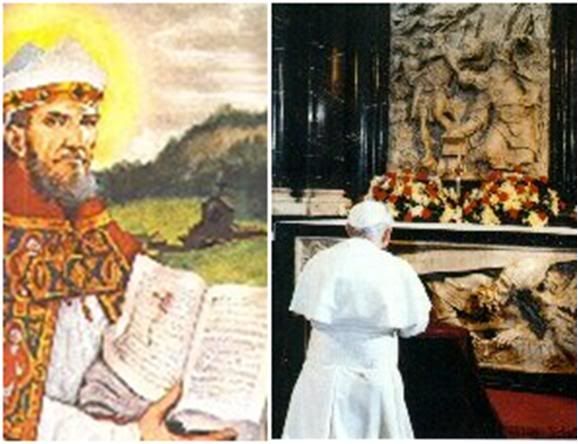 Right photo: John Paul II prays at St. Boniface's tomb in Fulda.
Right photo: John Paul II prays at St. Boniface's tomb in Fulda. One of his first biographers expressed this judgment of him: "The holy bishop Boniface can be said to be the father of all the inhabitants of Germany, because it was he who first generated Christ here with the words of his sacred preaching, he confirmed his words with his example, and finally, gave his life for them, a gift beyond which one cannot give more" (Otloh, Vita S. Bonifatii, ed. cit., lib. I, p. 158).
From a distance of centuries, what message can we draw today from the teaching and prodigious activities of this great missionary and martyr?
The first evident fact imposes itself on whomever approaches Boniface: the centrality of the Word of God, lived and interpreted in thefaith of the Church, a Word that he lived preached and testified to, up to the supreme gift of his martyrdom.
He was so passionate about the Word of God that he felt the urgency and the duty to bring it to others, even at personal risk. For this, he relied on the faith in whose dissemination he solemnly committed himself at his episcopal consecration: "I profess integrally the purity of the holy Catholic faith and with the help fo God, I wish to remain in unity with this faith, wherein lies, without a doubt, ths salvation of all Christians" (Epist. 12, in S. Bonifatii Epistolae, ed. cit., p. 29).
The second fact, a very important one, that emerges from the life of Bonfiace is his faithful communion with the Apostolic See, which was a central strongpoint in his missionary work. He always kept this communion as a rule of his mission and left it almost like a testament.
In a letter to Pope Zachary, he stated: "I never cease to invite and to submit to obedience to the Apostolic See those who wish to stay in the Catholic faith and the unity of the Roman Church, and to those whom God will give me as listeners and disciples int his mission"
(Epist. 50: in ibid. p. 81).
A fruit of this commitment was the firm spirit of cohesion with the Successor of Peter that Boniface transmitted to the Churches of his mission territory, uniting England, Germany and France to Rome, and contributing in decisive measure to implant the Christian roots of Europe which would produce fecund results in the succeeding centuries.
Boniface calls our attention for a third characteristic: He promoted the encounter between Roman-Christian culture and Germanic culture. He knew that to humanize and evangelize culture was an integral part of his mission as bishop.
In transmitting to them the ancient patrimony of Christian values, he
instilled in the German populations a new lifestyle that was more human, thanks to which there was greater respect for the inalienable rights of persons.
As an authentic son of St. Benedict, Bendict knew how to unite prayer with manual and intellectual work, the pen and the plow.
Boniface's courageous testimony is an invitation to all of us to wellcome the Word of God into our life as an essential reference point, to love the Church passionately, to feel ourselves co-responsible for her future, and to work for unity around the Successor of Peter.
At the same time, Boniface reminds us that Christianity, in favoring the diffusion of culture, promtoes human progress. It is for us to live up to such a prestigious patrimony and to make it fruitful in favor of the coming generations.
I am always impressed by Boniface's ardent zeal for the Gospel: At the age of 40, he leaves a beautiful and fruitful monastic life, alife as monk and professor, in order to announce the Gospel to simple folk, to barbarians; and at 80 years, once more, he goes to a place where he foresees his martyrdom.
Comparing this ardent faith of his, this zeal for the Gospel, to our faith that is so often tepid and bureaucraitzed, we see what we must do to renew our faith, and to give as a gift to our time the precious pearl of the Gospel.
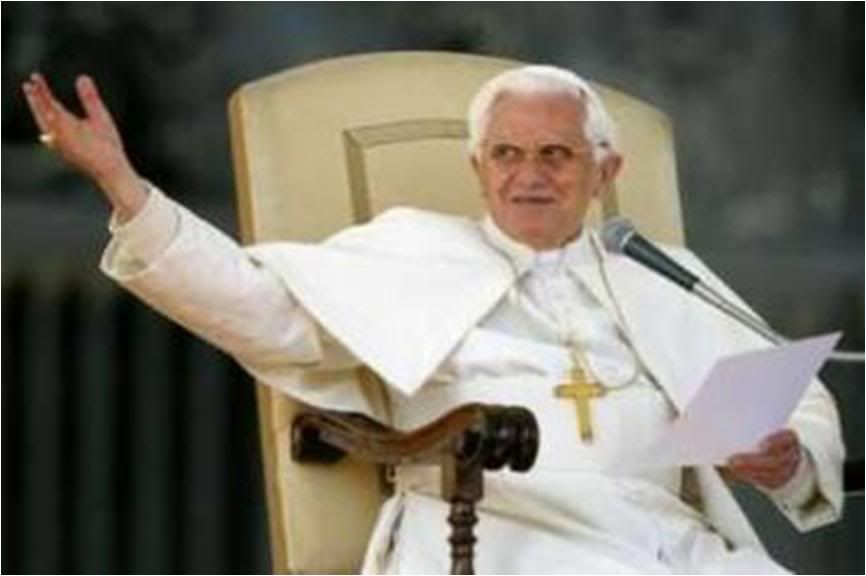
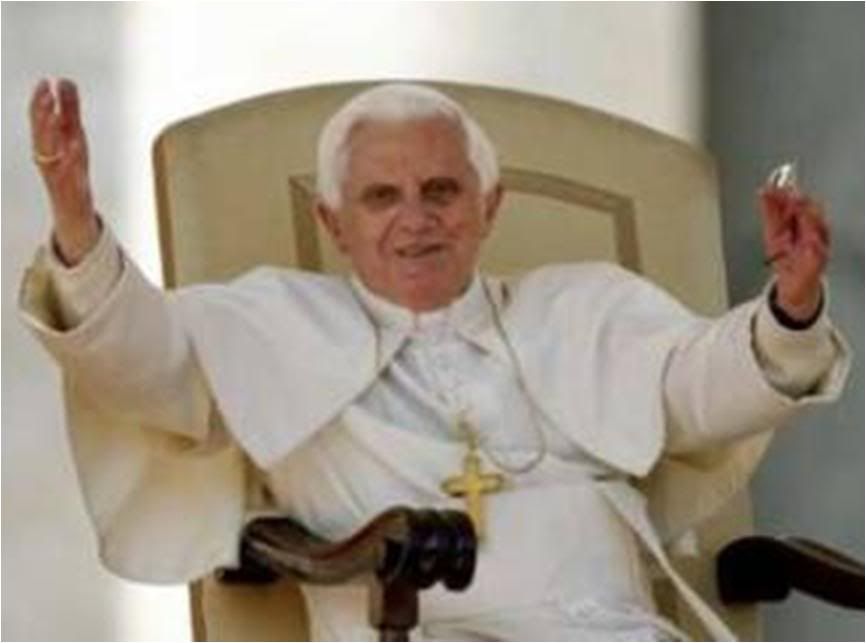
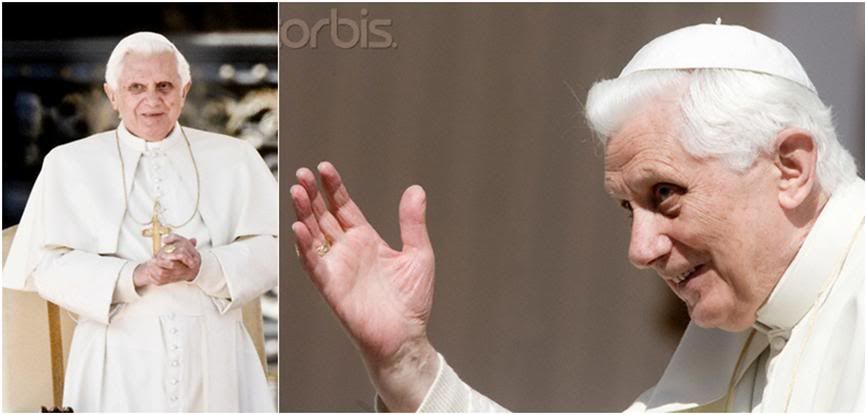
[Modificato da TERESA BENEDETTA 12/03/2009 12:30] |
 12/03/2009 09:59 12/03/2009 09:59 |
|
| | | OFFLINE | | Post: 16.799 | Registrato il: 28/08/2005
| Utente Gold | |
|


March 12
 Blessed Angela Salawa
Blessed Angela Salawa
Franciscan tertiary, Poland (1881-1922)
OR today.
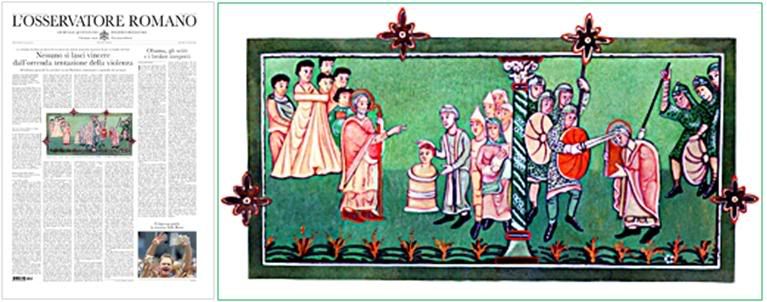 Illustration: St. Boniface baptizing the Frisians and undergoing martyrdom. From a 10th century miniature, Sacramentary of Fulda.
Illustration: St. Boniface baptizing the Frisians and undergoing martyrdom. From a 10th century miniature, Sacramentary of Fulda.
At the General Audience yesterday, the Pope condemns terrorist acts resurgent in Northern Ireland:
'Let no one yield to the horrendous temptation of violence'
The admonition followed the Holy Father's catechesis on St. Boniface, Apostle of Germany. The only 2 other Page 1 items are
a speculative commentary on a possible Obama strategy to engage the Shiite bloc of Islam (mainly Iran and Syria) in the Middle
East, and a story on the US stock rally following Citigroup's encouraging figures for January and February.
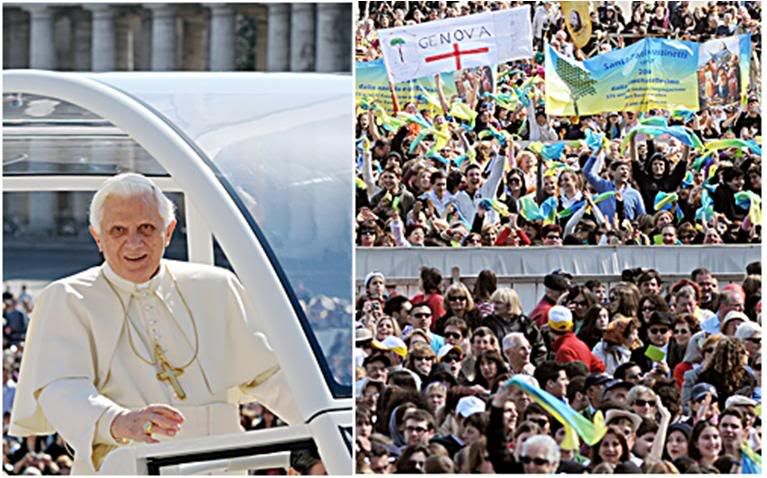 THE POPE'S DAY
THE POPE'S DAY
The Holy Father met today with -
- A delegation from the Cheif Rabbinate of Israel anad a delegation from the Vatican Commission for
Religious Relations with Judaism. The two bodies have been holding one of their regular sessions.
Address in English.
As announced, teh Vatican has released the full text of the "Letter of His Holiness Benedict XVI to the Bishops
of the Catholic Church on the remission of the excommunication of the four bishops consecrated by Mons. Lefebvre".
The text was distributed in its Italian, English, French, German, Spanish and Portuguese versions.
[Modificato da TERESA BENEDETTA 14/03/2009 11:05] |
 12/03/2009 12:24 12/03/2009 12:24 |
|
| | | OFFLINE | Post: 22 | Registrato il: 15/02/2009
| Utente Junior | |
|
The official version of the Pope's letter published by the Vatican today [Modificato da _benevolens_ 12/03/2009 12:26] |
 12/03/2009 12:35 12/03/2009 12:35 |
|
| | | OFFLINE | Post: 1.811 | Registrato il: 27/11/2005
| Utente Veteran | |
|
Thank you, dear benevolens!
God love him! He's being so open now, admitting that the internet is very powerful and should be consulted. But that wasn't his fault; someone should have been scouring the internet and should have seen that video of W's interview.
Holy Father, we love you and pray now that your action in this matter may bring about a return to unity within the Church and, ultimately, deeper understanding amongst all Christians. |
 12/03/2009 12:44 12/03/2009 12:44 |
|
| | | OFFLINE | | Post: 16.800 | Registrato il: 28/08/2005
| Utente Gold | |
|

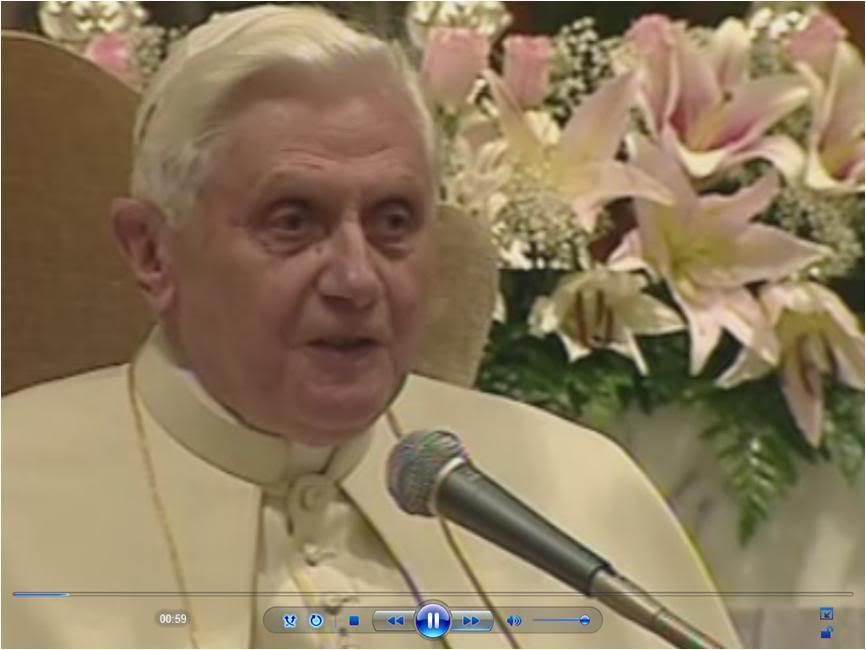
 LETTER OF HIS HOLINESS POPE BENEDICT XVI
LETTER OF HIS HOLINESS POPE BENEDICT XVI
TO THE BISHOPS OF THE CATHOLIC CHURCH
concerning the remission of the excommunication
of the four Bishops consecrated by Archbishop Lefebvre Dear Brothers in the Episcopal Ministry!
The remission of the excommunication of the four Bishops consecrated in 1988 by Archbishop Lefebvre without a mandate of the Holy See has for many reasons caused, both within and beyond the Catholic Church, a discussion more heated than any we have seen for a long time.
Many Bishops felt perplexed by an event which came about unexpectedly and was difficult to view positively in the light of the issues and tasks facing the Church today.
Even though many Bishops and members of the faithful were disposed in principle to take a positive view of the Pope’s concern for reconciliation, the question remained whether such a gesture was fitting in view of the genuinely urgent demands of the life of faith in our time.
Some groups, on the other hand, openly accused the Pope of wanting to turn back the clock to before the Council: as a result, an avalanche of protests was unleashed, whose bitterness laid bare wounds deeper than those of the present moment.
I therefore feel obliged to offer you, dear Brothers, a word of clarification, which ought to help you understand the concerns which led me and the competent offices of the Holy See to take this step. In this way I hope to contribute to peace in the Church.
An unforeseen mishap for me was the fact that the Williamson case came on top of the remission of the excommunication. The discreet gesture of mercy towards four Bishops ordained validly but not legitimately suddenly appeared as something completely different: as the repudiation of reconciliation between Christians and Jews, and thus as the reversal of what the Council had laid down in this regard to guide the Church’s path.
A gesture of reconciliation with an ecclesial group engaged in a process of separation thus turned into its very antithesis: an apparent step backwards with regard to all the steps of reconciliation between Christians and Jews taken since the Council – steps which my own work as a theologian had sought from the beginning to take part in and support.
That this overlapping of two opposed processes took place and momentarily upset peace between Christians and Jews, as well as peace within the Church, is something which I can only deeply deplore.
I have been told that consulting the information available on the internet would have made it possible to perceive the problem early on. I have learned the lesson that in the future in the Holy See we will have to pay greater attention to that source of news.
I was saddened by the fact that even Catholics who, after all, might have had a better knowledge of the situation, thought they had to attack me with open hostility.
Precisely for this reason I thank all the more our Jewish friends, who quickly helped to clear up the misunderstanding and to restore the atmosphere of friendship and trust which – as in the days of Pope John Paul II – has also existed throughout my pontificate and, thank God, continues to exist.
Another mistake, which I deeply regret, is the fact that the extent and limits of the provision of 21 January 2009 were not clearly and adequately explained at the moment of its publication.
The excommunication affects individuals, not institutions. An episcopal ordination lacking a pontifical mandate raises the danger of a schism, since it jeopardizes the unity of the College of Bishops with the Pope.
Consequently the Church must react by employing her most severe punishment – excommunication – with the aim of calling those thus punished to repent and to return to unity. Twenty years after the ordinations, this goal has sadly not yet been attained.
The remission of the excommunication has the same aim as that of the punishment: namely, to invite the four Bishops once more to return. This gesture was possible once the interested parties had expressed their recognition in principle of the Pope and his authority as Pastor, albeit with some reservations in the area of obedience to his doctrinal authority and to the authority of the Council.
Here I return to the distinction between individuals and institutions. The remission of the excommunication was a measure taken in the field of ecclesiastical discipline: the individuals were freed from the burden of conscience constituted by the most serious of ecclesiastical penalties.
This disciplinary level needs to be distinguished from the doctrinal level. The fact that the Society of Saint Pius X does not possess a canonical status in the Church is not, in the end, based on disciplinary but on doctrinal reasons.
As long as the Society does not have a canonical status in the Church, its ministers do not exercise legitimate ministries in the Church. There needs to be a distinction, then, between the disciplinary level, which deals with individuals as such, and the doctrinal level, at which ministry and institution are involved.
In order to make this clear once again: until the doctrinal questions are clarified, the Society has no canonical status in the Church, and its ministers – even though they have been freed of the ecclesiastical penalty – do not legitimately exercise any ministry in the Church.
In light of this situation, it is my intention henceforth to join the Pontifical Commission "Ecclesia Dei" – the body which has been competent since 1988 for those communities and persons who, coming from the Society of Saint Pius X or from similar groups, wish to return to full communion with the Pope – to the Congregation for the Doctrine of the Faith.
This will make it clear that the problems now to be addressed are essentially doctrinal in nature and concern primarily the acceptance of the Second Vatican Council and the post-conciliar magisterium of the Popes.
The collegial bodies with which the Congregation studies questions which arise (especially the ordinary Wednesday meeting of Cardinals and the annual or biennial Plenary Session) ensure the involvement of the Prefects of the different Roman Congregations and representatives from the world’s Bishops in the process of decision-making.
The Church’s teaching authority cannot be frozen in the year 1962 – this must be quite clear to the Society. But some of those who put themselves forward as great defenders of the Council also need to be reminded that Vatican II embraces the entire doctrinal history of the Church.
Anyone who wishes to be obedient to the Council has to accept the faith professed over the centuries, and cannot sever the roots from which the tree draws its life.
I hope, dear Brothers, that this serves to clarify the positive significance and also the limits of the provision of 21 January 2009.
But the question still remains: Was this measure needed? Was it really a priority? Aren’t other things perhaps more important?
Of course there are more important and urgent matters. I believe that I set forth clearly the priorities of my pontificate in the addresses which I gave at its beginning. Everything that I said then continues unchanged as my plan of action.
The first priority for the Successor of Peter was laid down by the Lord in the Upper Room in the clearest of terms: "You… strengthen your brothers" (Lk 22:32). Peter himself formulated this priority anew in his first Letter: "Always be prepared to make a defence to anyone who calls you to account for the hope that is in you" (1 Pet 3:15).
In our days, when in vast areas of the world the faith is in danger of dying out like a flame which no longer has fuel, the overriding priority is to make God present in this world and to show men and women the way to God.
Not just any god, but the God who spoke on Sinai; to that God whose face we recognize in a love which presses "to the end" (cf. Jn 13:1) – in Jesus Christ, crucified and risen.
The real problem at this moment of our history is that God is disappearing from the human horizon, and, with the dimming of the light which comes from God, humanity is losing its bearings, with increasingly evident destructive effects.
Leading men and women to God, to the God who speaks in the Bible: this is the supreme and fundamental priority of the Church and of the Successor of Peter at the present time.
A logical consequence of this is that we must have at heart the unity of all believers. Their disunity, their disagreement among themselves, calls into question the credibility of their talk of God. Hence the effort to promote a common witness by Christians to their faith – ecumenism – is part of the supreme priority.
Added to this is the need for all those who believe in God to join in seeking peace, to attempt to draw closer to one another, and to journey together, even with their differing images of God, towards the source of Light – this is interreligious dialogue.
Whoever proclaims that God is Love "to the end" has to bear witness to love: in loving devotion to the suffering, in the rejection of hatred and enmity – this is the social dimension of the Christian faith, of which I spoke in the Encyclical Deus Caritas Est.
So if the arduous task of working for faith, hope and love in the world is presently (and, in various ways, always) the Church’s real priority, then part of this is also made up of acts of reconciliation, small and not so small.
That the quiet gesture of extending a hand gave rise to a huge uproar, and thus became exactly the opposite of a gesture of reconciliation, is a fact which we must accept.
But I ask now: Was it, and is it, truly wrong in this case to meet half-way the brother who "has something against you" (cf. Mt 5:23ff.) and to seek reconciliation?
Should not civil society also try to forestall forms of extremism and to incorporate their eventual adherents – to the extent possible – in the great currents shaping social life, and thus avoid their being segregated, with all its consequences?
Can it be completely mistaken to work to break down obstinacy and narrowness, and to make space for what is positive and retrievable for the whole?
I myself saw, in the years after 1988, how the return of communities which had been separated from Rome changed their interior attitudes; I saw how returning to the bigger and broader Church enabled them to move beyond one-sided positions and broke down rigidity so that positive energies could emerge for the whole.
Can we be totally indifferent about a community which has 491 priests, 215 seminarians, 6 seminaries, 88 schools, 2 university-level institutes, 117 religious brothers, 164 religious sisters and thousands of lay faithful?
Should we casually let them drift farther from the Church? I think for example of the 491 priests. We cannot know how mixed their motives may be. All the same, I do not think that they would have chosen the priesthood if, alongside various distorted and unhealthy elements, they did not have a love for Christ and a desire to proclaim him and, with him, the living God.
Can we simply exclude them, as representatives of a radical fringe, from our pursuit of reconciliation and unity? What would then become of them?
Certainly, for some time now, and once again on this specific occasion, we have heard from some representatives of that community many unpleasant things – arrogance and presumptuousness, an obsession with one-sided positions, etc.
Yet to tell the truth, I must add that I have also received a number of touching testimonials of gratitude which clearly showed an openness of heart.
But should not the great Church also allow herself to be generous in the knowledge of her great breadth, in the knowledge of the promise made to her?
Should not we, as good educators, also be capable of overlooking various faults and making every effort to open up broader vistas?
And should we not admit that some unpleasant things have also emerged in Church circles?
At times one gets the impression that our society needs to have at least one group to which no tolerance may be shown; which one can easily attack and hate. And should someone dare to approach them – in this case the Pope – he too loses any right to tolerance; he too can be treated hatefully, without misgiving or restraint.
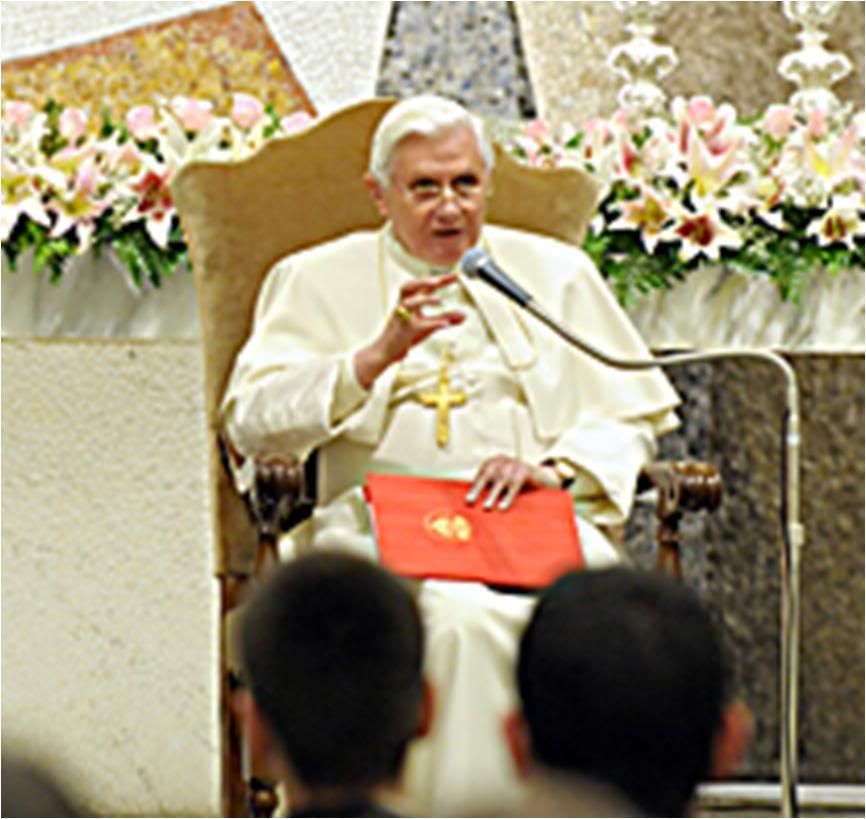
Dear Brothers, during the days when I first had the idea of writing this letter, by chance, during a visit to the Roman Seminary, I had to interpret and comment on Galatians 5:13-15.
I was surprised at the directness with which that passage speaks to us about the present moment: "Do not use your freedom as an opportunity for the flesh, but through love be servants of one another. For the whole law is fulfilled in one word: ‘You shall love your neighbour as yourself’. But if you bite and devour one another, take heed that you are not consumed by one another."
I am always tempted to see these words as another of the rhetorical excesses which we occasionally find in Saint Paul. To some extent that may also be the case.
But sad to say, this "biting and devouring" also exists in the Church today, as expression of a poorly understood freedom.
Should we be surprised that we too are no better than the Galatians? That at the very least we are threatened by the same temptations? That we must always learn anew the proper use of freedom? And that we must always learn anew the supreme priority, which is love?
The day I spoke about this at the Major Seminary, the feast of Our Lady of Trust was being celebrated in Rome. And so it is: Mary teaches us trust. She leads us to her Son, in whom all of us can put our trust. He will be our guide – even in turbulent times.
And so I would like to offer heartfelt thanks to all the many Bishops who have lately offered me touching tokens of trust and affection, and above all assured me of their prayers.
My thanks also go to all the faithful who in these days have given me testimony of their constant fidelity to the Successor of Saint Peter.
May the Lord protect all of us and guide our steps along the way of peace. This is the prayer that rises up instinctively from my heart at the beginning of this Lent, a liturgical season particularly suited to interior purification, one which invites all of us to look with renewed hope to the light which awaits us at Easter.
With a special Apostolic Blessing, I remain
Yours in the Lord,

From the Vatican, 10 March 2009
[Modificato da TERESA BENEDETTA 12/03/2009 13:51] |
 12/03/2009 13:19 12/03/2009 13:19 |
|
| | | OFFLINE | | Post: 16.801 | Registrato il: 28/08/2005
| Utente Gold | |
|

Just a few first impressions...
It would be very instructive to make a point-to-point confrontation between the Pope's letter and the sanctimonious, censorious statements released by the bishops' conferences of Germany, Austria and Switzerland, on this issue.
In tone and substance, and above all, in the fundamental attribute of Christian charity, the contrast could not be greater. How sad for the Pope that it is the bishops of the German-speaking countries that have shown themselves most ignominious in this whole affair, the most disobedient, rebellious and disrespectful of the Successor of Peter. [I think of Cardinal Kasper's old dispute with Cardinal Ratzinger over Kasper's contention that, in effect, the local Church takes precedence over the universal Church. It is interesting to see into what perverse paths German theology - outside Ratzinger- has led.]
One can better appreciate now the prompt support by the bishops of France, who had, in the past, been among the most acerbic dissenters to the Successor of Peter. And the beautiful letter of support from the Spanish bishops' conference. (I have to check back, but for once, I think Cardinal Bagnasco's CEI was not as up front in this as it has usually been on other matters.)
The fact that only a few bishops' conferences saw fit to send a message of support to the Holy Father (although many individual bishops did) only goes to show that erroneous interpretation of Vatican-II and its ideas on 'collegiality' - which led to the establishment of the national bishops' conferences - fostered this apparently widespread arrogance among the bishops of the Catholic Church who now think themselves the equal of the Successor of Peter and therefore free to defy him openly as they started to do with Summorum Pontificum and demonstrated far more directly in the case of the FSSPX.
Don't bishops have daily examinations of conscience like we simple faithful are taught to do? Don't they go to confession at all? Because if they did, they would see daily where they have gone so dreadfully wrong. What kind of faithful are they breeding if they themselves are so willfully erroneous?
Any layman's reading of Vatican-II documents on the function of bishops and their relationship to the Supreme Pontiff leaves no doubt whatsoever of the supremacy of the Pope over individual bishops (or bishops' conferences for that matter).
But one must believe the defiant bishops have not bothered to check back what Vatican-II really says, not since the heady days immediately following Vatican-II and the establishment of the bishops' conferences - they seem to have taken that as the equivalent of Jesus handing over the Keys of the Kingdom to Peter.
In their eyes, Vatican-II - their ultimate authority, it seems, above anything else in the Magisterium, as it is of all liberal dissidents who want to change the Church to suit their ideas - handed them the Keys of the Kingdom, to which they feel as entitled as the one and only Successor of Peter! How else does one explain their arrogance?
(A review of writings by advocates of the 'spirit of Vatican II' would probably show they cite Vatican-II far more overwhelmingly than they do anything from Scripture, or directly from Jesus himself! 'Spirit of Vatican II' has become their only Magisterium, their 'Sacred Scripture', their 'Holy Spirit', their virtual Lord and master. How can they not see what a parody they have made of their faith?]]
So it has come to this: that the Holy Father needs to remind bishops of the Catholic Church of certain basic facts about excommunication, and unity in the Church, and a Church that functions in love and charity, and that the Church has to set an example such love and charity to a world without God, instead of the bickering and exclusionism that characterized their reaction to the Pope's move towards the FSSPX.
The letter is Benedict XVI at his best and most personal, as he is when he takes questions directly, speaking his heart which is a heart that thinks, and not just speaking his mind as most intellectuals do.
It is the Benedict of that extemporaneous lectio magistralis to the Roman seminarians that so struck me with its simplicity and lack of artifice, and of course, that fortuitous choice of a passage from Galatians, and the spontaneous (and oh-so-timely commentary it merited from him.
At the time, few commentators even commented on it (perhaps because it wasn't widely reported, either). To have him reveal now that his commentary gave him the idea to write the letter is one of the many wonders of this letter which I insist has to be a most historic one.
Thank God we have Benedict XVI for our Pope today.
BENEDICTUS QUI VENIT IN NOMINE DOMINI!

[Modificato da TERESA BENEDETTA 15/03/2009 10:30] |
 12/03/2009 13:45 12/03/2009 13:45 |
|
| | | OFFLINE | | Post: 16.802 | Registrato il: 28/08/2005
| Utente Gold | |
|
 The Pope meets delegation
The Pope meets delegation
from Israel's Chief Rabbinate

The Holy Father met today with a delegation from the Grand Rabbinate of Israel and from the Commission for Religious Relations
with Judaism headed by Cardinal Walter Kasper.
Cardinal Kasper leads in Rabbi Shear Yashuv Cohen, Chief Rabbi of Haifa, and head of the Israeli delegation.
At Benedict XVI's invitation, Rabbi Cohen became the first Jew to address a Catholic bishops' synod last October.
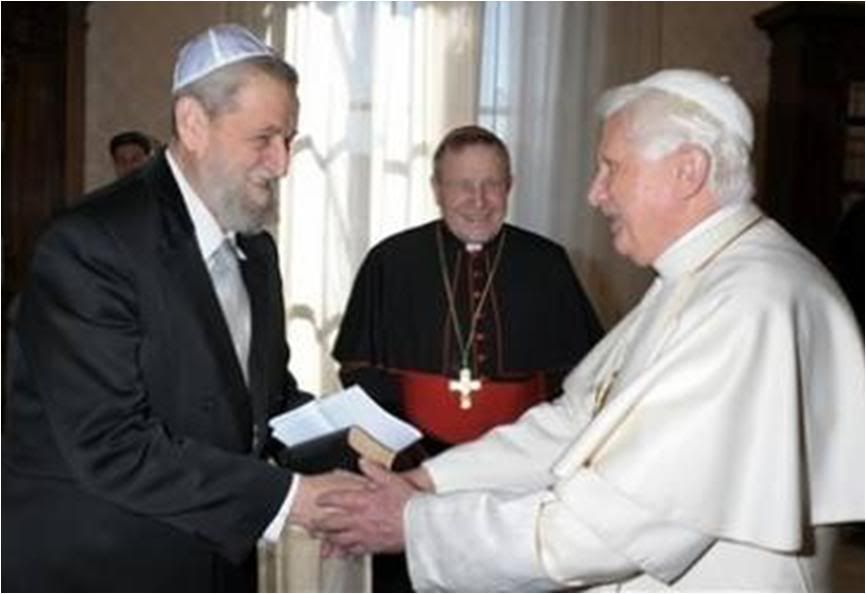
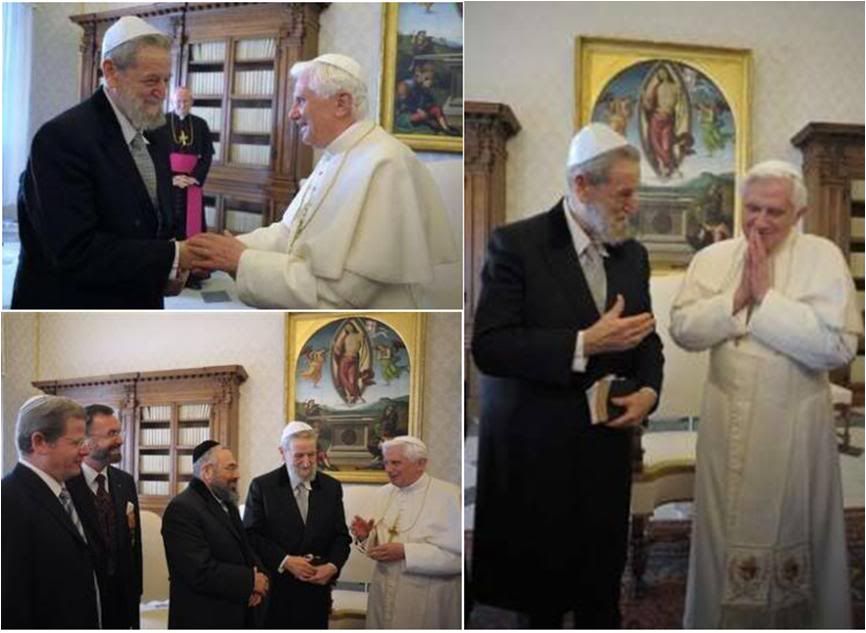 Here is the address the Pope delivered in English:
Here is the address the Pope delivered in English:
Distinguished representatives
of the Chief Rabbinate of Israel,
Dear Catholic Delegates,
It gives me great pleasure to welcome you, the delegation of the Chief Rabbinate of Israel, together with Catholic participants led by the Holy See's Commission for Religious Relations with the Jews.
The important dialogue in which you are engaged is a fruit of the historical visit of my beloved predecessor Pope John Paul II to the Holy Land in March 2000.
It was his wish to enter into a dialogue with Jewish religious institutions in Israel and his encouragement was decisive to attaining this goal. Receiving the two Chief Rabbis of Israel in January 2004 he called this dialogue a "sign of great hope".
During these seven years not only has the friendship between the Commission and the Chief Rabbinate increased, but you have also been able to reflect on important themes which are relevant to the Jewish and Christian traditions alike.
Because we recognize a common rich spiritual patrimony a dialogue based on mutual understanding and respect is, as Nostra Aetate (n. 4) recommends, necessary and possible.
Working together you have become increasingly aware of the common values which stand at the basis of our respective religious traditions, studying them during the seven meetings held either here in Rome or in Jerusalem.
You have reflected on the sanctity of life, family values, social justice and ethical conduct, the importance of the word of God expressed in Holy Scriptures for society and education, the relationship between religious and civil authority and the freedom of religion and conscience.
In the common declarations released after every meeting, the views which are rooted in both our respective religious convictions have been highlighted, while the differences of understanding have also been acknowledged.
The Church recognizes that the beginnings of her faith are found in the historical divine intervention in the life of the Jewish people and that here our unique relationship has its foundation.
The Jewish people, who were chosen as the elected people, communicate to the whole human family, knowledge of and fidelity to the one, unique and true God. Christians gladly acknowledge that their own roots are found in the same self-revelation of God, in which the religious experience of the Jewish people is nourished.
As you know, I am preparing to visit the Holy Land as a pilgrim. My intention is to pray especially for the precious gift of unity and peace both within the region and for the worldwide human family.
As Psalm 125 brings to mind, God protects his people: "As the mountains are round about Jerusalem, so the Lord is round about his people, from this time forth and for evermore".
May my visit also help to deepen the dialogue of the Church with the Jewish people so that Jews and Christians and also Muslims may live in peace and harmony in this Holy Land.
I thank you for your visit and I renew my personal commitment to advancing the vision set out for coming generations in the Second Vatican Council's declaration Nostra Aetate.
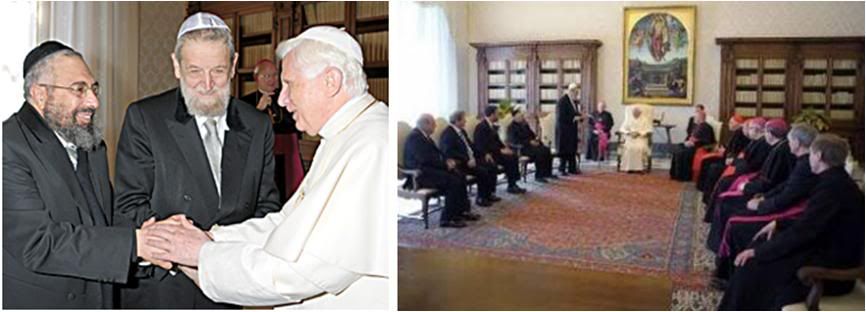 Pope tells rabbis that dialogue
Pope tells rabbis that dialogue
between Catholics and Jews
is 'necessary and possible'

Vatican City, March 12 (AsiaNews) - Dialogue between the Catholic Church and Jews is "necessary and possible," and the Pope hopes that his pilgrimage to the Holy Land, expected to take place in May, can contribute to this, "so that Jews and Christians and also Muslims may live in peace and harmony in this Holy Land."
During his trip, "my intention is to pray especially for the precious gift of unity and peace both within the region and for the worldwide human family."
Benedict XVI made these remarks today at an audience with a delegation from the Chief Rabbinate of Israel and from the Commission for Religious Relations with the Jews.
The Pope met the Jewish rabbis today, after an episode during which the Grand Rabbinate of Israel said it was "suspending" relations with the Catholic Church because of the Williamson case, but issued a statement a few days later to say they nad not suspended the relations at all.
However, the episode did lead to a two-week delay in the regular meeting between the Grand Rabbinate representatives and the Commission for Religious Relations with the Jews.
The Pope expressed his gratitude and desire to renew "my personal commitment to advancing the vision set out for coming generations in the Second Vatican Council's declaration Nostra Aetate."
Also today, Benedict XVI expressed his gratitude to the Jews in a letter to the bishops of the whole world made public today, where he pointed out that "our Jewish friends" have understood better than many Catholics the meaning of the lifting of excommunication for the Lefebvrists.
For the Rabbinate, today's encounter with the Pope "marks a positive change in the renewal of dialogue between us," The statement was made according to chief rabbi Shear-Yashuv Cohen, who stressed the 'clear and unequivocal statements condemning denial of the Holocaust' made by the Pope.
The rabbi also expressed his "profound concern about the clearly anti-Semitic nature of the text proposed for the UN conference" on racism, Durban 2.
The rabbis asked the Pope for an open criticism of the UN statement from the Vatican.
"We appreciate," he said, "the constructive role of the Vatican observer in the attempt to resist the distorted declaration, and we hope that the Holy See will make its voice heard in deploring this attack on the Jewish state."
[Modificato da TERESA BENEDETTA 12/03/2009 20:00] |
 12/03/2009 14:20 12/03/2009 14:20 |
|
| | | OFFLINE | | Post: 16.803 | Registrato il: 28/08/2005
| Utente Gold | |
|
 Frankly, I fail to see a rational basis for John Allen's conlusion as expressed in his title for this commentary. Why should the Jews be offended if he chooses not to visit a photo gallery that 'enshrines' one of his predecessors in a Hall of Shame? Yad Vashem is a huge sprawling institution, of which the Museum is but one part, adn the Photo Gallery a still smaller part. The whole place is a Memorial to the Holocaust. You pay tribute to its victims just by being there.
Frankly, I fail to see a rational basis for John Allen's conlusion as expressed in his title for this commentary. Why should the Jews be offended if he chooses not to visit a photo gallery that 'enshrines' one of his predecessors in a Hall of Shame? Yad Vashem is a huge sprawling institution, of which the Museum is but one part, adn the Photo Gallery a still smaller part. The whole place is a Memorial to the Holocaust. You pay tribute to its victims just by being there.
I don't think most VIP guests visit the Museum either unless they have a few hours to spare! (They are not exhibits that you wlrk through without full absorbed attention!] VIPs are taken to the Memorial Halls whose design and special effects are meant to evoke - and do, with numbing, chilling, spine-tingling horror! - the entire tragic weight of that human catastrophe, without need for the detailed evidence and milieu-creating minutiae that one sees in the Museum-proper.
As for the letter explaining why he recalled the exocmmunications, fie on what 'the Jews' may think - if by Jews Allen means the usual strident voices every ready with their Pavlov's-dog reflexes of berating the Pope and the Vatican at the slightest pretext. They have no say on what the Church does in its internal governance - nor about the practice of Christian charity, even if there does not seem to be a Jewish equivalent for it.
Pope Benedict decision might further irritate Jews:
He won't enter Israel’s main Holocaust museum

March 11, 2009
In moves that may further aggravate Jewish/Catholic tensions, a Vatican envoy has announced that Pope Benedict XVI will not enter Israel’s main Holocaust museum during his May 8-15 trip to the Holy Land, though he will stop at a memorial connected to the site, and the Pope has also sent a letter to the world’s Catholic bishops defending his controversial decision to lift the excommunication of four traditionalist prelates, including one who has denied the Holocaust.
Archbishop Antonio Franco, the Pope’s ambassador in the Holy Land, presented details of Benedict’s itinerary during a news conference Tuesday in Jerusalem. Franco said the Pope will not visit the museum section of Yad Vashem, Israel’s most important Holocaust memorial, though he will lay a wreath at the site’s Hall of Remembrance.
Vatican spokespersons pointed out that this was the same protocol followed by Pope John Paul II during his historic visit to Israel in March 2000. So why should Benedict XVI be expected to do something more? Surely, not even the Jews expect he would 'sanctify' their Hall of Shame and the ignominy to which they have subjected Pius XII!]
Other foreign dignitaries, however, typically go into the museum during state visits to Israel.
Benedict’s decision not to enter the museum itself is widely understood to be linked to an on-going dispute between Yad Vashem and the Vatican over the museum’s presentation of Pope Pius XII, the wartime pontiff accused by critics of “silence” during the Holocaust. Debate over Pius XII has long been a sticking point in Jewish/Catholic relations.
A caption below a large photo of Pius XII at Yad Vashem currently reads: “Even when reports about the murder of Jews reached the Vatican, the pope did not protest, either verbally or in writing. In December 1942, he abstained from signing the Allied declaration condemning the extermination of the Jews. When Jews were deported from Rome to Auschwitz, the pope did not intervene. The Pope maintained his neutral position throughout the war, with the exception of appeals to the rulers of Hungary and Slovakia toward its end. His silence and the absence of guidelines obliged churchmen throughout Europe to decide on their own how to react.”
[I must reiterate that more offensive than the caption is that the photographs of Pius XII are in the Museum's Hall of Shame!]
Church officials, including Benedict himself, have repeatedly objected to that caption, arguing that Pius lodged public protests where possible against Nazi atrocities, and also acted behind the scenes to save lives.
“He often acted secretly and in silence because, given the actual situation of that complex historical moment, he saw that this was the only way to avoid the worst and save as many Jews as possible,” Benedict said last September during a Mass marking the 50th anniversary of Pius’ death in 1958.
In response to those protests, Yad Vashem convened a behind-closed-doors summit of experts on Pius XII in early March to discuss the caption. A statement issued by museum officials, however, appeared to suggest that no changes are on tap: “The presentation of the subject in the Holocaust History Museum at Yad Vashem is based on the best research regarding this topic,” it said.
While in Jerusalem, Franco said, Benedict XVI will also become the first pope to visit the Dome of the Rock, one of the holiest sites in Islam. Muslims believe it marks the spot where Muhammad ascended to Heaven in the company of the angel Gabriel.
Meanwhile, Benedict XVI has sent a letter to Catholic bishops around the world defending his decision to lift the excommunications of four traditionalist bishops who form part of the Society of St. Pius X. One of those prelates, Bishop Richard Williamson, has a long record of casting doubt on the historical reality of the Holocaust.
The pope’s letter was reported March 11 by veteran Italian journalist Andrea Tornielli.
The Williamson affair, Benedict acknowledged in the letter, “has aroused, both inside and outside the Catholic church, a debate of a kind of vehemence that hasn’t been seen for a long time.”
Benedict called it an “unforeseen misfortune” that Williamson’s views on the Holocaust have obscured the real motives for lifting the excommunications, which, he suggested, had nothing to do with Jewish/Catholic relations or the Holocaust, but rather with healing the only formal schism within the Catholic church in the last 100 years.
“A discrete gesture of mercy towards four bishops, ordained validly but not legitimately, suddenly seemed like something totally different: like a denial of reconciliation between Christians and Jews, and therefore like a rejection of what the [Second Vatican] Council had taught in this regard for the path of the church,” the pope wrote.
Benedict said that reaction has been personally frustrating for him, since reconciliation between Christians and Jews has been “an aim of my personal theological work from the very beginning.” He also said that in the future the Vatican will have to pay more attention to the Internet as a source of information, since Williamson’s views on the Holocaust were easily available on-line.
The Pope made clear that although the bishops are no longer excommunicated, they still have no authority to exercise any ministry in the church, and their Society of St. Pius X is not recognized. For that to happen, the pope suggested, the traditionalists must accept the teaching of the Second Vatican Council (1962-65), including respect for Judaism: “The magisterial authority of the church can’t be frozen in 1962. That must be completely clear to the society,” he wrote.
While conceding that the motives for revoking the excommunication were not “explained in sufficiently clear fashion” at the time the decision was made, Benedict nevertheless defended the aim of reconciliation.
“Can we remain completely indifferent to a community with 491 priests, 215 seminarians, 117 brothers, 164 sisters and thousands of faithful?” the pope wrote. “Do we truly have to allow them to drift farther and farther from the church?”
Benedict seemed to bristle at suggestions that such outreach is unjustified: “Sometimes one has the impression that our society needs at least one group for which it has absolutely no tolerance, a group which it can hate with a clean conscience,” he wrote. “Then when someone dares to come close to that group – in this case, the pope – he too loses his right to tolerance, and he too can be treated with hate without any fear or reservation.”
The Pope also chided Catholics who criticized his move: “I’ve been saddened by the fact that even some Catholics, who ought to know how things stand, instead have struck at me with a kind of aggressive hostility,” the Pope wrote. “For precisely this reason, I want to thank all the more those Jews who have helped to remove misunderstanding, and to reestablish an atmosphere of friendship and trust.”
On March 17, Benedict XVI will begin a week-long trip to Africa, visiting the West African nations of Cameroon and Angola. He will then return to Rome for the celebrations of Holy Week and Easter, in addition to marking his 82nd birthday on April 16, before setting out again in May to visit Israel, the Palestinian Territories and Jordan.
[Modificato da TERESA BENEDETTA 12/03/2009 19:51] |
 12/03/2009 18:19 12/03/2009 18:19 |
|
| | | OFFLINE | | Post: 16.805 | Registrato il: 28/08/2005
| Utente Gold | |
|
 The Pope's letter to the bishops:
The Pope's letter to the bishops:
A document that deserves maximum attention
by Federico Lombardi, SJ
Translated from
the Italian service of

The "letter to the Bishops of the Catholic Church concerning the remission of the excommunication of the four Bishops consecrated by Archbishop Lefebvre" is a truly unusual document that deserves maximum attention.
Never before during his Pontificate has Benedict XVI expressed himself in a manner so personal and intense about a controversial subject. There is no doubt that the letter is his from the first to the last word. [As if anyone would dispute that!]
The Pope has lived through the episode of recalling the excommunications and the resulting reactions with evident participation and suffering.
He speaks of 'a discussion of a vehemence that has not been experienced in some time' that he felt constrained to intervene in order to "contribute to peace in the Church" which he sees all stirred up.
With his habitual lucidity and humility, he acknowledges limitations and errors that influenced negatively on the episode, and with great nobility, he did not attribute the responsibility to others, showing himself supportive of his co-workers.
He speaks of insufficient information regarding the Williamson case and of inadequate clarity in presenting the excommunication recall and its significance.
The paradox that a gesture meant to be one of mercy and reconciliation gave rise instead to a situation of acute tensions obliged him to examine what spiritual attitudes were manifest and operative in this episode.
The first criterion that the Pope asks to be reflected on is the command to reconcile with "the brother who has something against you", as the Lord says in the Sermon on the Mount.
The questions posed by the Pope are pressing, urged on by a most vivid concern for unity.
They do not lose a sense of realism, since they also point out the serious defects in so many expressions made by the traditionalists, as well as a similar critical realism that the Pope feels duty-bound to keep about the members of the Church and of a society that seems to oppose itself with irreducible intransigence to every effort of reconciliation or even of merely acknowledging positive elements in the 'other'.
The Pope's spiritual realism culminates in his recalling of the words of St. Paul to the Galatians whom he admonishes "not to bite and devour each other".
Beyond the errors and misadventures, which must be acknowledged sincerely and overcome as much as possible, beyond human prudence that is careful to avoid touching certain 'live nerves' [he uses the term 'punti critici', critical points, but I translated It in the sense I think he meant] , the Pope leads us back with determination and courage to the Gospel as the fundamental and ultimate criterion, not only of Christian and ecclesial life, but also of the governance of the Church.
Because only from our common conversion to this Gospel can we expect to overcome divisions and arrive at an understanding of the profound convergence between Tradition and the Council.
In the end, we understand that our Pope, expressing himself in the first person even in a situation of crisis, leads us to find once more the essential, most profound and radical point from which to start over.
![[SM=g27812]](https://im0.freeforumzone.it/up/0/12/5757084.gif) ![[SM=g27812]](https://im0.freeforumzone.it/up/0/12/5757084.gif) ![[SM=g27812]](https://im0.freeforumzone.it/up/0/12/5757084.gif) ![[SM=g27812]](https://im0.freeforumzone.it/up/0/12/5757084.gif) ![[SM=g27812]](https://im0.freeforumzone.it/up/0/12/5757084.gif) ![[SM=g27812]](https://im0.freeforumzone.it/up/0/12/5757084.gif) ![[SM=g27812]](https://im0.freeforumzone.it/up/0/12/5757084.gif) ![[SM=g27812]](https://im0.freeforumzone.it/up/0/12/5757084.gif) ![[SM=g27812]](https://im0.freeforumzone.it/up/0/12/5757084.gif) ![[SM=g27812]](https://im0.freeforumzone.it/up/0/12/5757084.gif) Unfortunately, despite the release of the full letter, the Anglophone news agencies still choose to focus the story as if it were primarily about the Bishop Williamson's Holocaust negationism!.
Unfortunately, despite the release of the full letter, the Anglophone news agencies still choose to focus the story as if it were primarily about the Bishop Williamson's Holocaust negationism!.
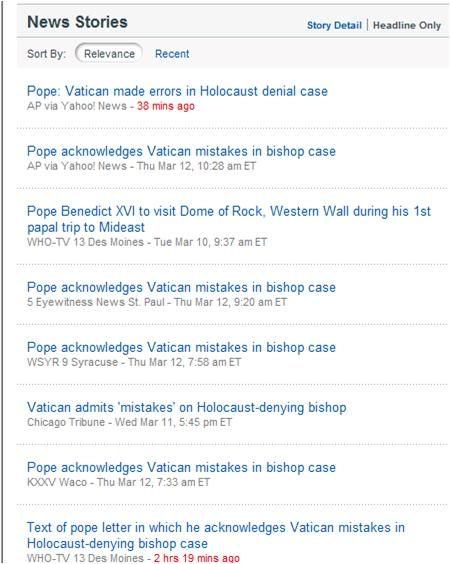 Just the top of the current online catalog of the news that is bering carried in the MSM...
Just the top of the current online catalog of the news that is bering carried in the MSM...
and it's all the same....
Pope: Vatican made errors
in Holocaust denial case
By VICTOR L. SIMPSON

VATICAN CITY, March 121 (AP) – Pope Benedict XVI has made an unusual public acknowledgment of Vatican mistakes and turmoil in his church over an outreach to ultraconservatives that led to his lifting the excommunication of a Holocaust-denying bishop.
In an attempt to end one of the most serious crises of his papacy, he said in a letter released Thursday that the Vatican must make greater use of the Internet to prevent other controversies.
The Vatican took the rare step of releasing the German-born Pope's personal account of the incident addressed to Catholic bishops around the world.
Vatican spokesman the Rev. Federico Lombardi said the letter — released in six languages — was "really unusual and deserving of maximum attention."
It recalled his apology in 2006 after his remarks linking Islam to violence caused a storm in the Islamic world. He said then he was "deeply sorry."
Popes are traditionally protective of their office and their aides but the last time a Pope explicitly proclaimed infallibility on matters of faith and morals was in 1950.
The Vatican has said that Benedict did not know that British-born Bishop Richard Williamson was a Holocaust denier when he lifted his excommunication on Jan. 24.
Benedict, in an implicit criticism of aides, said that not searching the Internet for information before lifting the excommunications Jan. 24 was an "unforeseen mishap" that caused tensions between Christians and Jews.
Williamson had denied in an interview with Swedish TV broadcast earlier in January [Deliberately misleading and dishonest not to say it was broadcast on January 21, despite having been taped in November 2008, because of advance reports that the Pope was set to lift the excommunications, and as it happens, the night they brodcast the interview was also the day on which the excom recall decree was signed] that 6 million Jews were killed by the Nazis. He said about 200,000 or 300,000 were murdered and none were gassed.
His excommunication was lifted along with three other ultraconservative bishops' in an attempt to bring dissidents back into the mainstream Church. [Again deliberately disingenuous - the way Simpson states it, a casual reader might think Williamson was somehow the 'primary' beneficiary of the excom recall: the fact is that one of the four bishops is the Superior-General of the FSSPX - not to metntion that when reporting is an oversight w reporter does not generally make, unless he wants to make it appear the Pope was primarly looking out for Williamson!]
Instead, the move outraged many Jews and Catholics, including bishops in Benedict's native Germany, when Williamson's views became widely known and the interview was widely viewed on the Internet. German Chancellor Angela Merkel, a Protestant, demanded clarification from Benedict [two days after he already made a public explanation at the General Audience! - Why should she get off appearing as if she was righteously indignant, when she was a Janey-ciome-lately?]]
The Pope said the controversy resulted from an "unforeseen mishap" that made his efforts of "mercy" toward the excommunicated bishops seem like a repudiation of reconciliation between Christians and Jews.
"That this overlapping of two opposing processes took place and momentarily upset peace between Christians and Jews, as well as peace within the church, is something which I can only deeply deplore," he wrote.
Benedict wrote that he was saddened that even who should know better "thought they had to attack me with open hostility."
The Pope thanked "all the more our Jewish friends" for understanding his commitment to friendship.
Benedict also held a meeting Thursday with a delegation of Israel's chief rabbinate as part of regularly planned consultations to discuss aspects of Catholic and Jewish religious teachings.
The Pope said he hopes his visit to the Holy Land in May can foster understanding among religions. He said he remains committed to a landmark document issued by the Second Vatican Council that states the church deplores all forms of anti-Semitism.
"My intention is to pray especially for the precious gift of unity and peace both within the region and for the worldwide human family," Benedict said of his May 8-15 visit to the Holy Land.
"May my visit also help to deepen the dialogue of the Church with the Jewish people so that Jews and Christians and also Muslims may live in peace and harmony in this Holy Land," he said.
Rabbi Shear-Yashuv Cohen of Haifa called the audience "a special experience ... because it marks an end of a crisis."
In the letter, Benedict defended his attempts to bring ultraconservative faithful loyal to the anti-modernization movement of the late Archbishop Marcel Lefebvre back into the church's fold.
But he acknowledged that "another mistake, which I deeply regret" was made in not properly explaining his intentions and the limits of the procedure and that some groups had accused him of seeking to "turn back the clock."
"That the quiet gesture of extending a hand gave rise to a huge uproar, and this became exactly the opposite of a gesture of reconciliation, is a fact which we must accept," Benedict said.
But he said the Church cannot be indifferent to a movement that counts 491 priests, 215 seminarians and six seminaries.
"Should we casually let them drift farther from the Church?" he asked.
![[SM=g27812]](https://im0.freeforumzone.it/up/0/12/5757084.gif) ![[SM=g27812]](https://im0.freeforumzone.it/up/0/12/5757084.gif) ![[SM=g27812]](https://im0.freeforumzone.it/up/0/12/5757084.gif) ![[SM=g27812]](https://im0.freeforumzone.it/up/0/12/5757084.gif) ![[SM=g27812]](https://im0.freeforumzone.it/up/0/12/5757084.gif) ![[SM=g27812]](https://im0.freeforumzone.it/up/0/12/5757084.gif) ![[SM=g27812]](https://im0.freeforumzone.it/up/0/12/5757084.gif) ![[SM=g27812]](https://im0.freeforumzone.it/up/0/12/5757084.gif) ![[SM=g27812]](https://im0.freeforumzone.it/up/0/12/5757084.gif) ![[SM=g27812]](https://im0.freeforumzone.it/up/0/12/5757084.gif) And the Times of London's Richard Owen starts from the wrong premise.... though perhaps he thought he was being original!
The Papal apology
And the Times of London's Richard Owen starts from the wrong premise.... though perhaps he thought he was being original!
The Papal apology
by Richard Owen in Rome

Pope Benedict XVI's anguished and unusually personal letter to Catholic bishops admitting that he failed to foresee the "mishap" over his reinstatement of a Holocaust-denying bishop raises the question of whether his credibility - and with it that of the papacy itself - has been undermined.
[The question of credibility never enters into this! The apology is only for the communications mishandling, not for the action itself - a papal prerogative under his Christ-given mandate to 'to bind and unloosen' - which, in fact, he takes greta pains to explain, as in a Canon Law 101 refresher lesson for Catholic bishops who have forgotten all about it.]
That Popes are fallible is not a new concept. The Catholic Church’s teaching on papal infallibility is often misunderstood: formulated at the First Vatican Council in 1870 and re-affirmed at the Second Vatican Council in the 1960s, it refers only to "definitive and binding" doctrinal pronouncements on faith and morals (the Magisterium), not to administrative or diplomatic actions.
For that matter it does not state that the Pope cannot sin in his personal life. In other words, it does not mean the Pope cannot make mistakes. When Pope Benedict issued the first volume of his study of Jesus of Nazareth, he told readers in a preface that the book "is solely an expression of my personal search ... Everyone is free to contradict me."
The debacle of the Williamson affair none the less gives the impression that four years after his election, the German-born Benedict does not have the grip on the Vatican hierarchy (let alone its PR machine) many had expected from a man whose iron rule of the Vatican's doctrinal department for two decades earned him the nickname "Panzerkardinal".
The pained and self critical tone of the letter suggests that the Pope himself realises this. At a briefing to "explain" the Pope's "mea culpa", Father Federico Lombardi, the Pope's spokesman, said Benedict had "never expressed himself in so personal a manner" since he was elected.
Asked if he could recall a precedent, Father Lombardi replied that the letter was "certainly uncommon, singular, subjective". The Pope had "suffered" over the affair, and had "courageously" taken the blame himself, with "humility and great nobility", without trying to shift it onto his advisers.
The papacy is sometimes described as the last absolute monarchy in Europe - which makes the governing style of the monarch all the more vital.
Pope Benedict, a conservative, scholarly theologian, sees only a handful of advisers, does not talk to a variety of visitors over lunch or dinner as John Paul II often did, and puts the unity of the Catholic Church above all other priorities. [He may not talk to them over lunch or dinner, but he talks to them in formnal and informal audiences. Ach, this sorry and completely unfounded journalistic commonplace of Benedict XVI's 'isolation'!]
The result has been one public relations disaster after another, beginning with his remarks on "violent and irrational" Islam at Regensburg three years ago.
Instead of lifting the excommunications of Bishop Williamson and three other bishops from the ultra-conservative Society of St Pius X founded by the late Archbishop Marcel Lefebvre, he could have demanded that they first unconditionally accept his authority and the reforms of Vatican II.
[Owen obviously completely misses the point, not to mention that he ignores the history of the four years that preceded the Pope's excom recall, nor that the Pope, even in the decree of January 21, points out that it is an act of mercy on his part "to open the door for further dialog".
If any of his advisers had told him to be unconditional first, he would have explained to them why he wants to clear the books, as it were, on the part of the Vatican, so that now the burden is on the FSSPX to respond with the same magnanimity.]
No adviser, it seems, warned him of the pitfalls: but even if they had, he was apparently determined to go ahead.
The Pope's vow in his letter to pay more attention to the Internet in future is a step forward: after all, it would have taken only a Google search to turn up Bishop Williamson's extreme views on the Holocaust. [I have commented extensively before on this now-established myth that "it would have taken only a Google search to turn up Bishop Williamson's extreme views on the Holocaust". That is not so at all - not before January 21!!!!!]
Williamson had denied in an interview with Swedish TV broadcast in January that 6 million Jews were killed by the Nazis. He said about 200,000 or 300,000 were murdered, and that none were gassed. [ DIM]8pt[=DIM][Again, this journalist fails to mention the very relevant point that this interfiew was never aired nor reported upon before January 21. Failing to mention relevant facts when they would tend to weaken your argument is a common dishonest practice among journalists.]
Benedict's committment to inter-faith dalogue, Father Lombardi says, is "beyond discussion", as is his committment to the reforms of the Second Vatican Council. But what anguished him most, it seems, is that a move intended to restore unity to the Catholic Church ended by having precisely the opposite effect. He is saddened, he says in the letter, that Catholics who should know better "thought they had to attack me with open hostility."
"That the quiet gesture of extending a hand gave rise to a huge uproar, and this became exactly the opposite of a gesture of reconciliation, is a fact which we must accept," Pope Benedict writes. This had generated "a discussion more heated than any we have seen for a long time..........an avalanche of protests was unleashed, whose bitterness laid bare wounds deeper than those of the present moment."
The question is whether those wounds can be healed and unity restored. The Pope announced that he was putting the Pontifical Commission "Ecclesia Dei," which has handled reconciliation efforts with ultra-traditionalist groups, under the auspices of the Congregation for the Doctrine of the Faith, which he used to head.
The problem is that getting a grip in this way by re-asserting authoritarian papal rule is at odds with collegial discussion within the Church on its future.
[Aw, grow up, Owen, and read Vatican-II documents for a change! Your udnerstanding of what 'collegial' is is the liberal, 'spirit of Vatican II' understanding of it - namely, that each local bishop has as much authority as the Pope himself even over matters that reagrd the Universal Church!]
The Pope, Father Lombardi insists, is not trying to impede debate within the Church - provided it is "well-intentioned and constructive".
In his letter, the Pope quotes St Paul's warning to the Galatians ((5:13-15): "If you bite and devour one another, take heed that you are not consumed by one another", adding "Sad to say, this biting and devouring also exists in the Church today".
But what some in the Church see as a savage free-for-all, others see as "well-intentioned and constructive debate." [And what were those sanctimonious, censorious statements from some bishops' conferences and individual bishops but 'savage free-for-all' assaults on the Holy Father?]
The Pope hopes his letter will draw a line under the row and restore "peace to the Church", so it can put the episode aside and move forward. But the underlying tensions over what the way forward is remain unresolved. [Unresolved only to the degree that bishops fail to understand what is Peter's due and what is theirs!]
The CNS report is a mixed bag...
Papal letter:
Pointed, personal and from the heart
By John Thavis

VATICAN CITY, March 12 (CNS) -- In one fell swoop, Pope Benedict XVI has taken charge of the much-criticized realm of "Vatican communications" following his lifting of the excommunication of four traditionalist bishops, including one who denied the extent of the Holocaust.
The Pope's letter to the world's bishops, made public March 12, was remarkable on many counts:
-- First, he candidly admitted mistakes in the way he and other Vatican officials handled the reconciliation move with the bishops of the Society of St. Pius X.
Most specifically, he said they should have used the Internet to find out what millions of others already knew: that one of the four, Bishop Richard Williamson, was known for his radical views on the Holocaust.
-- Second, the Pope revealed how deeply stung he was by the criticism of those who felt he was "turning back the clock" or repudiating Catholic-Jewish dialogue.
His line about even some Catholics attacking him "with open hostility" showed that even in his supposed isolation as Supreme Pontiff this is a man who cares deeply about the reaction among the faithful.
[How can even someone like John Thavis simply take the MSM line about the 'supposed isolation' of Benedict XVI and repeat it without a single statement to refute it? He covers the Vatican daily, and therefore occasionally gets assigned to the news pools covering the Pope's daily activites, and he has covered him on his trips abroad.
The Pope's nteraction with the people he meets, even those who sees for a few seconds, is so obvious, and it goes without saying that his communications would be far more intensive with those he meets in private or special audience. Besides, he reads newspapers and new books and watches the news on TV.
How can anyone - and I mean the Marco Politis and John Allens out there, who have made this 'isolation' one of their stock commonplaces for Benedict XVI - even label him isolated?]
-- Third, he put the Pontifical Commission Ecclesia Dei on a shorter leash. By placing it under the control of the Congregation for the Doctrine of the Faith, the Pope effectively limited the commission's ability to freelance agreements with traditionalist groups without proper attention to doctrinal differences.
[ This is most unfair to Ecclesia Dei, which has never 'free-lanced' agreements with traditionalist groups! To begin with, the only traditionalist groups it has dealt with have all been offshoots of the FSSPX, and the model for dealing with their doctrinal questions was Cardinal Ratzinger's unimplemented 1988 agreement with Mons. Lefebvre.
[It makes sense now that the doctrinal issue has come down to the FSSPX mother society itself, rahter than its small offshoots which never involved more than a handful of priests, the CDF takes over. For the same reason, I suppose, that John Paul II assigned the liaison with Mons. Lefebvre to his CDF Prefect at the time!]
-- Fourth, he strongly defended his outreach to the Society of St. Pius X to those in the Church who consider the group marginal and unimportant.
He described his task as preserving unity so that witness to the Gospel is credible, and warned that divisions in the Church -- the "biting and devouring" described by St. Paul in the Church's first century -- are always counterproductive.
The 2,500-word papal letter was unusually pointed and direct, and showed Pope Benedict's own skills as a communicator once he puts pen to paper. His acknowledgment of mistakes in communications and Vatican ignorance of the Internet was unprecedented.
"I have learned the lesson that in the future in the Holy See we will have to pay greater attention to that source of news," he said.
Coincidentally, his letter came as the Pontifical Council for Social Communications was hosting a weeklong seminar on the Church and "new media," with the idea that a new document may be needed to promote effective church use of online opportunities.
To many observers, the realignment of the "Ecclesia Dei" commission was a sign of disapproval of how the commission's president, Cardinal Dario Castrillon Hoyos, managed this phase of talks with the Society of St. Pius X. Cardinal Castrillon, who turns 80 in July, will probably leave his post soon.
[To his credit, Cardinal Castrillon has not reacted publicly to all the scapegoating of him from all sides. He shares part of the blame, true, but not in greater measure, say, than the Secretary of State or the Prefect of the Congregation for Bishops, not to mention the whokle communications set-up.]
Vatican officials have pointed to Cardinal Castrillon as the man who should have briefed the Pope more fully on Bishop Williamson ahead of time. But the Pope's dissatisfaction may run deeper than that.
Since the excommunications were lifted, the society's superior, Bishop Bernard Fellay, has insisted that his organization is far from ready to accept some teachings of the Second Vatican Council.
In fact, Bishop Fellay has suggested that removal of the excommunications merely sets the stage for the real battle over Vatican II -- a battle the Pope has no interest in fighting.
All this hints that perhaps the Pope was not fully prepared for the society's inflexibility on some of these points.
Placing "Ecclesia Dei" under the doctrinal congregation also ensures that other Vatican agencies will be consulted on such reconciliation moves in the future, the Pope said in his letter. That answered a specific complaint from Cardinal Walter Kasper, who coordinates dialogue with the Jews and who said his agency was never consulted on the latest concessions to the Society of St. Pius X.
The Pope's message to the wider Catholic world was just as direct and just as heartfelt. He said his overture to the traditionalists had a strategic purpose, that of building Church unity in an age when the world seems to be rejecting the Christian message.
[It is really very sad - and indicative of what has happened to most of the bishops around the world - when the Pope has to explain to them why Church unity is needed! And when the most vehement opponents to the very orthodox FSSPX within the Church are those liberal bishops who have been flouting Catholic orthodoxy since Vatican-II according to their mistaken belief that Vatican-II - their idea of it, anyway - has superseded ev erything else that came before.]
In three or four sentences, he summed up what he views as the challenges and the primary objectives of his pontificate:
"In our days, when in vast areas of the world the faith is in danger of dying out like a flame which no longer has fuel, the overriding priority is to make God present in this world and to show men and women the way to God," he said.
As God disappears from the human horizon, he said, humanity is losing its bearings, with increasingly "evident destructive effects."
" Leading men and women to God, to the God who speaks in the Bible: This is the supreme and fundamental priority of the church and of the successor of Peter at the present time. A logical consequence of this is that we must have at heart the unity of all believers. Their disunity, their disagreement among themselves, calls into question the credibility of their talk of God," he said. [This really is the key statement in the whole letter, which othr stories hardly even mention.]
The Pope's plea was for mainstream Catholics to see outreach to the traditionalists not as a step backward but as an attempt to incorporate the adherents of extremism in a way that helps break down their rigidity and releases their "positive energies."
The Pope said the Church should "allow herself to be generous" and "be capable of overlooking various faults and making every effort to open up broader vistas" in order to promote this unity. Those are words that will likely be quoted in the future, and not only by Catholic traditionalists.
[Yes, but obviously the Pope does not include approval of abortion, contraception, reproductive rights, gay marriages, women priests and the whole gamut of liberal Catholic causes, in those 'broader vistas'!
It did strike me reading the letter yesterday that the Catholic left would not lose time trying to apply the Pope's logic of unity to their case! Escept that a) they are not organized as the FSSPX and their offshoots are, and b) they are really convinced the Church will cave in to them, or alternatively, that they will soon be 'Church' as claimed by one of their more infamous groups.]
[Modificato da TERESA BENEDETTA 13/03/2009 16:16] |
 12/03/2009 21:31 12/03/2009 21:31 |
|
| | | OFFLINE | | Post: 16.806 | Registrato il: 28/08/2005
| Utente Gold | |
|


I was just getting set to translate a bunch of snippets from Italian news agencies on the Holy Fahter's meeting today with a delegation from the Grand
Rabbinate of Israel, from statements made by the rabbis at a news conference held afterwards at Vatican Radio headquarters [whose papal mural makes
a great background for any newscon held there!
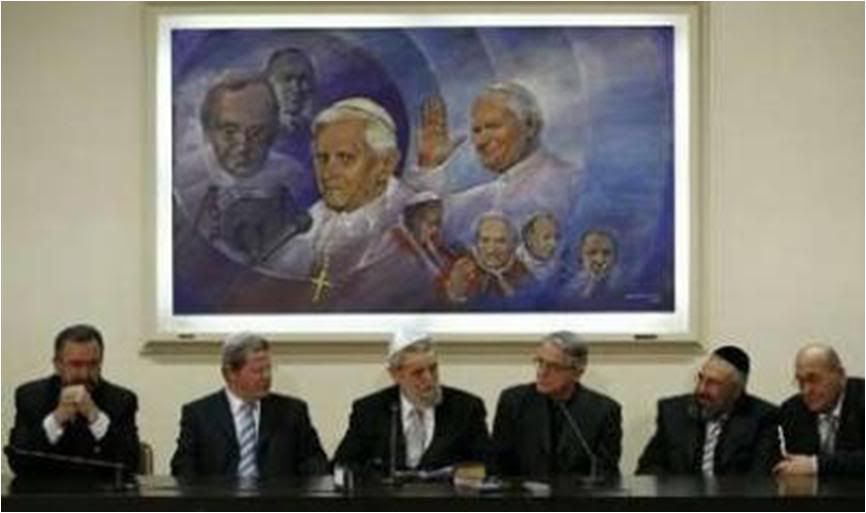
But dpa has come up with a good round-up that also includes its report on the Pope's letter, which has a surprisingly good lead that does not follow
the MSM herd mentality for a change!
Pope 'saddened' by attacks,
thanks 'Jewish friends'
By Peter Mayer

Vatican City, March 12 (dpa) - In an unusually strongly-worded letter, Pope Benedict XVI has admitted that the Vatican made mistakes in efforts to reinstate four ultra-traditionalist bishops, while saying he was "saddened" by Catholics who attacked him over the issue.
At the same time, he thanked "Jewish friends" for their support in the matter.
The March 10 letter by the German-born pontiff to Roman Catholic bishops was made public by the Vatican on Thursday in six languages.
It also came on the day in which Benedict received a top-level delegation of Israeli rabbis who had initially threatened to cut links with the Vatican over views on the Holocaust held by one of the ultra-traditionalist clerics, British-born Bishop Richard Williamson.
In the letter, Benedict also provided a spirited defence of his decision in January to lift excommunication orders issued in 1988 against the four bishops of the Society of Saint Pius X (SSPX).
He "deeply deplored" that his "discreet gesture of mercy" was seen as "the repudiation of reconciliation between Christian and Jews," because of Williamson's remarks on the Holocaust.
Williamson, in a television interview broadcast around the time the excommunications were lifted, denied the scale of the Holocaust, saying he believed the Nazis had not used gas to kill Jews.
A row ensued with many Jews, but also Catholics and government officials, including German Chancellor Angela Merkel, demanding an explanation.
The Vatican subsequently said it was not aware of Williamson's views, but critics have pointed out that remarks written by the bishop in which he cast doubt on the historical veracity of the Holocaust have been available on the internet for some time.
Benedict, in the letter, acknowledged this, writing: "I have learned the lesson that in the future in the Holy See we will have to pay greater attention to that source of news (the internet)."
"Another mistake, which I deeply regret, is the fact that the extent and limits of the provision of 21 January 2009 were not clearly and adequately explained at the moment of its publication," Benedict said referring to the lifting of the excommunication orders.
Still, the Pontiff said he was saddened by the "open hostility" which some Catholics, who should have known better, had shown him.
"Precisely for this reason I thank all the more our Jewish friends, who quickly helped to clear up the misunderstanding and to restore the atmosphere of friendship and trust which - as in the days of Pope John Paul II - has also existed throughout my pontificate and, thank God, continues to exist," Benedict wrote.
On Thursday, the US-based World Jewish Congress (WJC), which had initially led some of the criticism levelled at the Vatican over the Williamson affair, praised Benedict in a statement.
The Pontiff's letter "conveys the essential requirements for inter-religious dialogue: candour and the willingness to tackle difficult issues squarely, " WJC President Ronald Lauder said. statement.
Last month the WJC and other Jewish representative bodies welcomed a Vatican demand that Williamson repudiate his Holocaust claims, as well as statements from Benedict deploring denial of the Holocaust.
Since then, ties have improved further with an announcement that Benedict will visit Israel in May, a point stressed on Thursday by Israel's Chief Rabbi Shear-Yashuv Cohen during an audience with the pontiff.
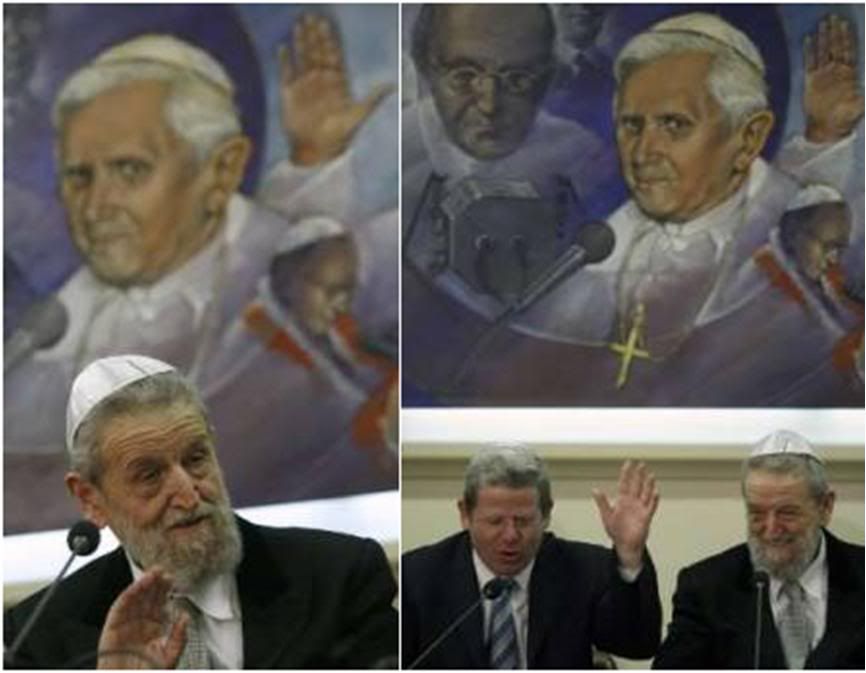 Rabbi Cohen at the news conference after the meeting with the Pope; in the right photo, with Oded Wiener, secretary-general of Israel's Grand Rabbinate..
Rabbi Cohen at the news conference after the meeting with the Pope; in the right photo, with Oded Wiener, secretary-general of Israel's Grand Rabbinate..
The meeting marked a "turning point in the renewal of dialogue between us," Cohen, who in the immediate wake of the Williamson controversy had suspended contacts with the Vatican, told Benedict.
Cohen also urged the Pontiff to make the history of the Holocaust a "required" teaching subject in Catholic schools worldwide to reinforce what he said was the pontiff's declaring anti-Semitism as a "sin against God."
Benedict devoted the final and longest portion of the letter to explaining in detail the reasoning behind his overtures to the four dissident bishops and the SSPX.
He recalled how the SSPX's rift with mainstream Catholicism came about when, in 1988, Archbishop Marcel Lefebvre, a critic of the 1960s reform process known as the Second Vatican Council, consecrated the four bishops without a papal mandate.
The SSPX still does not enjoy canonical status within the church and its ministers "do not exercise legitimate ministries," unless there is an acceptance of the Second Vatican Council.
Among the reforms was the replacing of the Latin Rite Mass with services in local languages, and a commitment to improved relations between Catholic and Jews.
"The Church's teaching authority cannot be frozen in the year 1962 - this must be quite clear to the Society," Benedict said of SSPX strict adherence to pre-Council traditions.
But he justified his decision to lift the excommunications, saying they formed part of the mission of his pontificate: "the unity of all believers," and that working for a return of those Catholics represented by SSPX to the mainstream Church, formed part of this.
"Can we be totally indifferent about a community which has 491 priests, 215 seminarians, 6 seminaries, 88 schools, 2 university- level institutes, 117 religious brothers, 164 religious sisters and thousands of lay faithful? Should we casually let them drift farther from the Church?" Benedict asked in the letter.
World Jewish Congress praises
Pope Benedict's letter to bishops

March 12, 2009
Ronald S. Lauder, president of the World Jewish Congress (WJC), praised Pope Benedict XVI for issuing a personal letter to Catholic bishops explaining the circumstances of the Williamson affair.
"The Pope has found clear and unequivocal words regarding Bishop Williamson's Holocaust denial, and he deserves praise for admitting that mistakes were made within the Vatican in the handling of this affair," Lauder said.
"The pope's letter conveys the essential requirements for inter-religious dialogue: candor and the willingness to tackle difficult issues squarely. His expressed anguish at the events following the Holocaust-denying statements by Williamson reflects the similar emotional pain felt by Jews worldwide during this affair," he continued.
"We reciprocate his words of appreciation for Jewish efforts to restore inter-religious dialogue and will continue to work with the Catholic Church to further strengthen mutual understanding and respect," the WJC president stated.
[Modificato da TERESA BENEDETTA 12/03/2009 21:42] |
 13/03/2009 00:26 13/03/2009 00:26 |
|
| | | OFFLINE | Post: 3.662 | Registrato il: 23/11/2005
| Utente Master | |
|
Understanding the 'Scholar Pope'
BBC
March 12, 2009
Nearly four years have passed since the election of Pope Benedict XVI. They have been marked by several eruptions of controversy. David Willey reflects on the performance so far of the former Cardinal Joseph Ratzinger.
Does the Pope live in a bubble?
Seated at his desk in his huge high-ceilinged penthouse study at the top of the Apostolic Palace, looking out over the bell towers, cupolas, monuments and rooftops of Rome, Pope Benedict may well reflect with satisfaction that nowadays the head of the Catholic Church is neither a "Prisoner in the Vatican" nor the "Pope-King," as some of his predecessors were called.
But he had to admit during a closed meeting with Rome's parish priests the other day that, cloistered in his frescoed palace, he does feel a bit remote, a bit distant from their lives and the daily challenges they face as they minister to a rapidly changing and an increasingly multicultural and multi-faith society in the Eternal City.
Earlier this week, on a rare official visit to Rome's City Hall, Benedict used a good phrase to describe the Italian capital. "This singular metropolis," he called it.
Rome really is an unusual place, for squeezed within its teeming metropolitan area is the Pope's surviving sovereign territory, occupying an area the size of 40 football pitches. A walled fortress complex and a park is all that remains of the former papal states of central Italy.
Behind city walls
Inside Vatican City quiet and order reign.
Strolling through the Pope's manicured private gardens, under the ever-watchful eye of Vatican gendarmes, you can still hear the distant roar of Rome's incessant traffic just outside the walls.
Next to the offices of the governor of Vatican City is the branch line railway station where no passenger trains ever arrive, but duty free goods for Vatican employees enter the Pope's domain in a sealed wagon once a week.
Continuing around the back of Saint Peter's Basilica you come upon the former Mint (the Pope used to coin his own currency) and the kitchen garden and hothouses, which provide vegetables and cut flowers for the Pope's dining table and honey for his breakfast.
Vatican City also has its own Post Office and postage stamps, its own radio station and newspaper, the Osservatore Romano, a publishing house, a world famous library, and a dispensary and chemists shop run by monks and nuns where, incidentally, condoms are not stocked.
'Papal gaffes'
It is the Pope's Museums and the Sistine Chapel which attract the biggest crowds of all.
Some four million visitors every year - far more than those attending papal audiences - pay their entry fees and swarm through the museum turnstiles, contributing to the upkeep of these unique collections of paintings, frescoes and sculptures reflecting the changing tastes of papal patrons of art down the centuries.
Well, to come back to the question I asked before. Does this strange gilded cage in which the Pope spends his life mean that he has become so detached from the ordinary concerns of the majority of his flock - so immersed in his theological and academic studies - that he is out of touch with ordinary Catholic believers?
I ask the question only because of a series of acts or remarks which have aroused surprise and criticism and have been described (even in the Catholic press) as "papal gaffes".
There was a reference to the historic connection between Islam and violence which caused serious offence in many Muslim countries.
There was a decision to readmit to the church a controversial traditionalist bishop. Benedict was "unaware" about the bishop's record of anti-Semitism, an official Vatican statement said.
In a letter addressed to the world's Roman Catholic bishops, Pope Benedict admits the case has been mishandled.
“ The Pope usually finds the right words in the end ”
And then there was the unfortunate promotion to bishop - quickly followed by resignation - of a controversial Austrian priest.
The priest's remarks about Hurricane Katrina being due to divine displeasure at the sins of the citizens of New Orleans had caused a mini-revolt in the Catholic church in Austria.
The answer appears to be that Pope Benedict runs a very tight ship and that he relies upon a tiny group of close advisers to help him make his decisions.
This may mean that sometimes the normal bureaucratic procedures, the checks and balances operating within the Secretariat of State (the nerve centre of the central government of the Catholic Church) are not being carried out correctly.
'Scholar Pope'
But meanwhile, a new encyclical letter by the Pope - his highest form of teaching - is about to be published.
It will deal with the moral and social issues behind the global economic crisis. He says it is proving more difficult to write than he first imagined because of the unexpected complexity of the meltdown.
But the Pope usually finds the right words in the end.
Standing on a balcony during his visit to Rome's City Hall, built over the site of a long vanished temple, Benedict sympathised with the plight of modern Romans who are losing jobs and suffering from the economic downturn just like everyone else.
The "Scholar-Pope" was unable to resist the temptation of quoting a line written in Latin, not from the Bible, but by the Roman poet Ovid 2,000 years ago: "Perfer et obdura: multo graviora tulisti."
"Endure and resist," he urged. "In the past you have overcome much more difficult situations."
**********************************************************************
I am surprised - and very grateful - that David Willey, who has written some poisonous articles about Benedict in the past, has turned in a fiarly sympathetic piece this time. (I think the last time he saveged the Pope was during the trip to Brazil.)
Particularly surprising is his line this time that "In the end, the Pope always finds the right words" - even if such a statement presupposes that he starts out with the wrong ones.
Too bad he does not pursue his original question about wehter the Pope is really isolated.
How quickly Vaticanistas forget or ignore the fact that Benedict XVI spent the 23 years before he became Pope as a Borgo resident who walked around his beighborhood daily, getting to observe the everyday sights of the city and meeting other city residents carrying out their routine activities; that he apparently had a fairly active social life, with many longtime friends, ecclesiastical and civilian, in Rome; that he also appears to be an industrious correspondent who keeps up with some friends by letter and telephone; that he gets to meet and talk to a broad spectrum of persons in his various audiences and public outings; and most of all, that he reads a lot.
He would never have been able to formulate his powerful analyses of the modern world's cultural, political and social situations - well developed and publicly known through his books and articles - if he were a truly 'isolated' person. His conclusions and deducatiions come as much from systematic reasoning as from keen observation.
No keen observer can ever be considered isolated because how else could he observe? - and that is why I so resent it when intelligent people like Marco Politi and John Allen and their echochambers in the MSM so cavalierly call him 'isolated'.
And not keeping what was almost like a daily 'open house' at the papal apartments like his predecessor did is not isolation, either!
TERESA
[Modificato da TERESA BENEDETTA 13/03/2009 00:57] |
 13/03/2009 00:27 13/03/2009 00:27 |
|
| | | OFFLINE | | Post: 16.807 | Registrato il: 28/08/2005
| Utente Gold | |
|
 Tomrorow's issue of L'Osservatore Romano plays up the Pope's letter to bishops around the world,
Tomrorow's issue of L'Osservatore Romano plays up the Pope's letter to bishops around the world,
accompained by a front-page editorial.
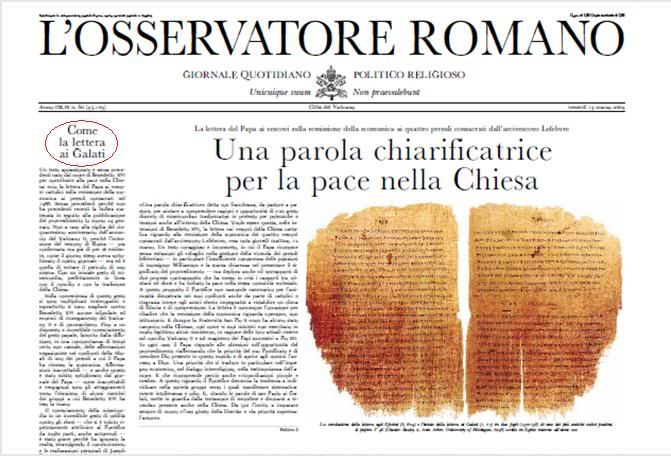 A clarifying world for the peace of the Church
Illustration: The concluding page of the Letter to the Ephesians, and the first page of the Letter to the Galatians.
A clarifying world for the peace of the Church
Illustration: The concluding page of the Letter to the Ephesians, and the first page of the Letter to the Galatians.
Papyrus P46, University of Michigan. Provenance: Egypt, ca. 200
Like the Letter to the Galatians
Editorial
by Giovanni Maria Vian
Translated from
the 3/13/09 issue of

An impassioned text without precedent, from the heart of Benedict XVI, to contribute to the peace of the Church: that is the letter of the Pope to Catholic bishops about why he lifted the excommunication from four bishops illegally consecrated in 1988.
Unprecedented because there has been no recent precedent either to the storm of criticism that he had to bear after the recall was announced on January 24.
It was not by chance that the announcement was made on the 50th anniversary of John XXIII's announcement about a Second Vatican Council, because the intention of the Bishop of Rome - now confirmed, but always evident per se, and as this newspaper underlined that day - was and is to avoid the risk of a formal schism. With an initial gesture of mercy perfectly in line with Vatican-II and with the Tradition of the Church.
Questions have proliferated over the 'convenience' of this gesture, but more than that, unfounded and enormous accusations were made against Benedict XVI, particularly about ignoring Vatican II and/or obscurantism.
Which all resulted in a dishonest and incredible 'turning upside down' of the papal act - helped along by a broadcast, whose timing was certainly not by chance, of negationist statements on the Shoah by one of the bishops whose excommunication was lifted.
Such statements are unacceptable - which was also immediately underscored by the Pope's newspaper - as unacceptable and shameful as the attitude towards Jews by some of the members of the group to which the Pope has held out a conciliatory hand.
Upturning the Pope's act of mercy to make it an act of hostility against the Jews - something repeatedly attributed to the Pontiff by many quarters, including authoritative persons - was truly grievous because it ignores reality, willfully distorting the convictions and personal experiences of Joseph Ratzinger as theologian, bishop and Pope available in multiple texts that are accessible to everyone.
In the face of such concentric attacks, even from some Catholics - and some even expressed 'with hatred' - Benedict XVI said that he was all the more grateful to those Jews who had helped him to overcome the difficult moments, confirming the desire for friendship and brotherhood that has its roots in our common faith in one God and in the Scriptures.
The lucidity of the Pope's analysis does not avoid difficult questions that remain open, such as the need for more prepared and timely communications from the Vatican, in a global context where information - omnipresent and super-abundant - is continuously exposed to manipulation and exploitation, as well as 'leaks' which it is difficult not to call pitiful.
Problems, too, within the Roman Curia - a historically collegial organism - which has a duty to set an example for the entire Church.
But the Pope then confronts the heart of the issue: the problem with the so-called traditionalist groups and the danger of formal schism, with a distinction between disciplinary and doctrinal levels.
In other words, on the disciplinary level, Benedict XVI has recalled the bishops' excommunication. But on the doctrinal level, it is necessary that the traditionalists - whom the Pope does not spare from severe tones while he is confident about reconciliation - do not consider Church teaching frozen as of 1962.
In the same way, the self-proclaimed great defenders of Vatican II should remember that it cannot be separated from the faith that has been professed and confessed through the centuries.
And was this act really a priority? The Pope says Yes, because in a world where the flame of faith risks being snuffed out, the priority is precisely to lead men to the God who spoke on Sinai and who manifested himself in Jesus. A God who is at risk of disappearing from the human horizon and who can be made credible only by the testimony of unity among those who believe in him.
That it is why the unity of the Catholic Church and its commitment to ecumenism are important, and why inter-religious dialog is equally significant.
That is why the great Church - a term dear to tradition - should seek out peace with everyone.
That is why Catholics should not tear each other to pieces like the Galatians to whom St. Paul, around the year 56, wrote one of his most dramatic and beautiful letters.
Like this one from Pope Benedict.
[Modificato da TERESA BENEDETTA 13/03/2009 00:30] |
 13/03/2009 00:33 13/03/2009 00:33 |
|
| | | OFFLINE | Post: 3.663 | Registrato il: 23/11/2005
| Utente Master | |
|
Rabbis after pope meeting: Crisis over
LISA PALMIERI-BILLIG, jpost correspondent in rome
THE JERUSALEM POST
Mar. 12, 2009
"The Jewish people, who were chosen as the elected people, communicate to the whole human family knowledge of and fidelity to the one, unique and true God," Pope Benedict XVI told a delegation from Israel's Chief Rabbinate on Thursday in Rome.
Also present at the papal audience were representatives of the Vatican's Commission for Religious Relations with Jews.
"This was not just another meeting," commented Haifa Chief Rabbi She'ar-Yashuv Cohen, who headed the delegation. "This was a special experience, a turning point, the end of a crisis. We could not have expected a warmer reception."
The crisis in question was the case of Holocaust-denying Bishop Richard Williamson, whose excommunication from the Catholic Church was lifted last December along with that of three other priests who, together with Williamson, had refused to accept the reforms of Vatican II and ordained other priests without permission.
In a letter to the German Episcopate, released Thursday, Benedict admitted his error in the case, stating that a "mishap" had taken place due to the insufficient study of information taken from the Internet.
"I have learned the lesson that in the future, the Holy See will have to pay greater attention to that source of news," he declared.
Benedict said Williamson's views had made his efforts of "mercy" toward the excommunicated bishops seem like a repudiation of reconciliation between Christians and Jews.
"That this overlapping of two opposing processes took place and momentarily upset peace between Christians and Jews, as well as peace within the church, is something I can only deeply deplore," the pope said.
He added that he was saddened that even Catholics "thought they had to attack me with open hostility."
"I thank all the more our Jewish friends, who quickly helped to clear up the misunderstanding and to restore the atmosphere of friendship and trust, [which,] thank God, continues to exist," he said.
Rabbi David Rosen, the American Jewish Committee's international director of interreligious affairs, confirmed that all members of the delegation had been convinced of the pope's deep commitment to Catholic-Jewish relations.
"Moreover," Rosen said, "the pope clarified that no member of the Lefebvrist Pius X Society can be reinstated without accepting the important Vatican II reforms regarding dialogue with Jews and other religions, religious liberty, ecumenism, etc." Rosen was speaking of the order to which Williamson and the others belonged.
Periodic meetings of the Chief Rabbinate and Vatican representatives were initiated by Pope John Paul II in 2004.
Other members of the delegation were Chief Rabbinate Secretary-General Oded Wiener, Kiryat Ono Chief Rabbi Rasson Arussi and Israeli Ambassador to the Holy See Mordechai Lewy.
Cohen, the delegation leader, said it now seemed more likely that there would be positive consequences for the delegation's request that Catholic schools all over the world teach about the Holocaust.
The Vatican expressed continued commitment to fighting anti-Semitism, and both sides mentioned that full preparations were underway for the pope's forthcoming visit to Israel in May, which will be of both a religious and diplomatic nature. President Shimon Peres will accompany Benedict throughout the visit.
"My intention is to pray especially for the precious gift of unity and peace," Benedict said.
He quoted Psalms 125, saying, "God protects his people: 'As the mountains are round about Jerusalem, so the Lord is round about his people, from this time forth and for evermore.'"
In his letter Thursday, which was released in six languages, Benedict defended his attempts to bring ultraconservative Catholics loyal to the anti-modernization movement of the late Archbishop Marcel Lefebvre back into the church's fold.
But he acknowledged that "another mistake, which I deeply regret," had been made in not properly explaining his intentions and the limits of the procedure, and that some groups had accused him of seeking to "turn back the clock."
"That the quiet gesture of extending a hand gave rise to a huge uproar, and [that] this became exactly the opposite of a gesture of reconciliation, is a fact which we must accept," Benedict said.
But he added that the church could not be indifferent to a movement that numbered 491 priests, 215 seminarians and six seminaries.
"Should we casually let them drift farther from the church?" he asked.
|
 13/03/2009 00:56 13/03/2009 00:56 |
|
| | | OFFLINE | Post: 3.665 | Registrato il: 23/11/2005
| Utente Master | |
|
Pope to visit Rome synagogue in autumn
Thu Mar 12, 2009 3:53pm EDT
ROME (Reuters) - Pope Benedict will make his first visit to Rome's synagogue in the autumn, Jewish community officials and the Vatican said on Thursday.
The late Pope John Paul became the first pope since the times of the apostles to enter a synagogue when he visited Rome's temple on the banks of the Tiber in 1986 and made a historic speech calling Jews "our beloved elder brothers."
Benedict has already visited synagogues in his native Germany and in the United States.
But a visit to Rome's temple is thick with historical significance because of the troubled relationship over the centuries between the papacy and the local Jewish community, the oldest in the diaspora.
The date for the visit has not been set.
Relations between Catholics and Jews have been under severe strain in the past few months over the pope's decision to lift the excommunication of a traditionalist bishop who denies the Holocaust.
The pope has since made several major declarations to repudiate Bishop Richard Williamson's views and condemn anti-Semitism and Holocaust denial. Jewish officials from Israel met the pope on Thursday and later declared the crisis over.
|
 13/03/2009 01:54 13/03/2009 01:54 |
|
| | | OFFLINE | | Post: 16.808 | Registrato il: 28/08/2005
| Utente Gold | |
|
 Mons. Bernard Fellay has responded to the Pope's letter.
Mons. Bernard Fellay has responded to the Pope's letter.
Here is a translation from the French site of DICI, the FSSPX information agency:
 
COMMUNIQUE FROM THE SUPERIOR-GENERAL
Fraternité Sacerdotale Saint-Pie X
Pope Benedict XVI has written a letter to the bishops of the Catholic Church dated March 10, 2009, in which he made known to them the intentions which guided him in the important step that was taken with the Decree of January 21, 2009.
After the recent 'avalanche of protests unleashed', we sincerely thank the Holy Father for having reset the discussion to the level where it ought to be, that of the faith.
We fully share his priority concern to preach "in our days, when in vast areas of the world, the faith is in danger of dying put like a flame which no longer has fuel".
The Church, in fact, is going through a major crisis which cannot be resolved without an integral return to the purity of the faith. With St. Athanasius, we profess that "Whoever wishes to be saved should have the Catholic faith; whoever does not keep it whole and inviolable is doomed, without a doubt, to eternal loss" (Symbole Quicumque).
Far from wishing to freeze Tradition in 1962, we wish to consider Vatican-II and the post-conciliar Magisterium in the light of Tradition, which St. Vincent de Lerins defined as "that which has been believed always, everywhere, and by everyone" (Communitorium), without rupture and in perfectly homogeneous development. It is thus that we can contribute to the evangelization demanded by the Savior (cf Mt 28,19-20).
The Priestly Fraternity of St. Pius X assures Benedict XVI of its desire to undertake the doctrinal conversations acknowledged to be 'necessary' by the Decree of January 21, in order to serve the revealed Truth which is teh first charity that must be manifested towards all men, Christian or not.
We assure him of our prayers that his faith may stay firm so that he may confirm all his brothers in this faith (cf Lk 22,32).
We place these doctrinal conversations under the protection of Our Lady of Trust, with the assurance that she will obtain for us the grace to faithfully transmit what we have received - 'tradidi quod et accepi' (I Cor 15,3).
Menzingen, March 12, 2009
+ Bernard Fellay
The FSSPX has been very consistently on message since January 21. Let me just re-post this editorial from their early February bulletin on DICI:
 The stakes are doctrinal
The stakes are doctrinal
Editorial by
Abbe Alain Lorans

Bulletin #189
February 7-21, 2009
Two weeks have gone which have been full of relevant news. The decree of January 21, 2009, and the media campaign arising from the statements of Mons. Williamson to Swedish TV must be analyzed amply and calmly.
Starting with this special issue, we are presenting some useful documents for this purpose which will be followed through in succeeding issues.
The doctrinal questions that must now be the subject of 'necessary discussions' between the FSSPX and the Holy See, under the terms of teh Jan. 21 decree, are fundamental.
The weekly magazine La Vie, in its issue for the week after the decree was published, contained an article by a Dominican which shows the necessity for such discussions.
Fr. Claude Geffré, who has been very much involved in inter-religious dialog, said bluntly: "It is true that the texts
[of Vatican II) are often ambiguous. Indeed, in order to arrive at a greater voting consensus among the Conciliar Fathers, it has occurred that the point of view of an irreducible [Lorans's note: meaning 'traditional'] minority has been juxtaposed with that of a crushing majority [Lorans's note: meaning "progressivist']".
The juxtaposition of two points of view - one 'irreducible' and the other 'crushing' - cannot have been better said.
[Modificato da TERESA BENEDETTA 14/03/2009 17:14] |
 13/03/2009 13:56 13/03/2009 13:56 |
|
| | | OFFLINE | | Post: 16.810 | Registrato il: 28/08/2005
| Utente Gold | |
|


March 13
 St. Leander of Seville
St. Leander of Seville
Bishop, Spain (534-600)
OR today.
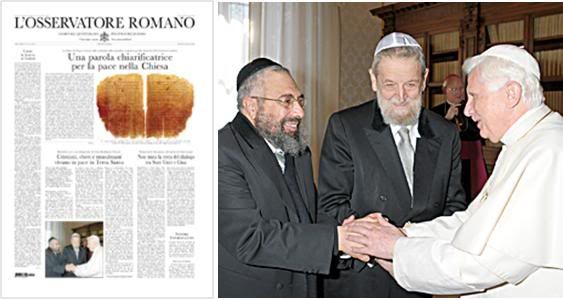
The Pope's letter to all Catholic bishops on his conciliatory act towards the Lefebvrians:
A clarificatory word for the peace of the Church
The Pope's letter is presented with an editorial (translated in an earlier post above). The other papal
story on Page 1 is the Pope's meeting with the delegation from the Grand Rabbinate of Israel who
took part in a regular meeting with the Vatican's Commission for Religious Relations with Judaism.
The other story is about US-China relations staying on the path of dialog despite divergences on
human rights.
THE POPE'S DAY
At 9 a.m., the Holy Father joined the members fof theCuria at the Redemptoris Mater chapel of the Apostolic Palace to listen to the first Lenten Sermon by Fr. Raniero Cantalamessa, O.F.M. Cap.
This year's theme is: "'The law of the Spirit which gives life in Christ Jesus' (Rm 5,2) - Meditations on Chapter VIII of the Letter to the Romans".
The sucsessive Friday Lenten sermons will be on March, March 27 and April 3.
The Holy Father met today with
- Bishops of Argentina (group 1) on ad-limina visit, led by Cardinal Jorge Bergoglio, Archbishop of Buenos Aires.
- Participants in the Plenary Session of the Congregation for Divine Worship led by the Prefect,
Cardinal Antonio Canizares. Address in Italian.
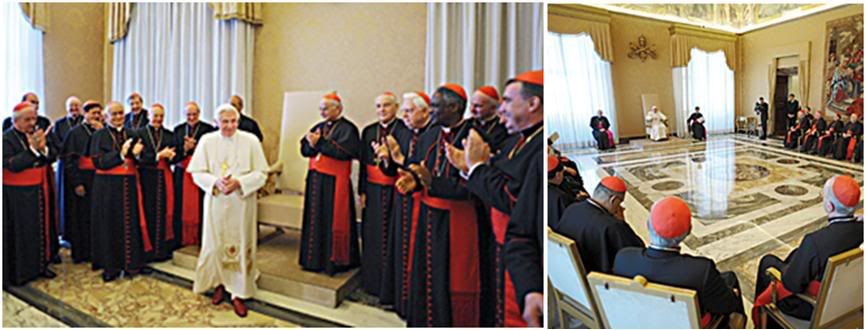
In the afternoon, he met with
- Bishops of Argentina (Group 2) on ad limina visit
- Mons. Luis Ladaria Ferrer, secretary of the Congregation for the Doctrine of the Faith (weekly meeting)
representing the Prefect, Cardinal William Levada.
[Modificato da TERESA BENEDETTA 14/03/2009 11:44] |
 13/03/2009 14:07 13/03/2009 14:07 |
|
| | | OFFLINE | | Post: 16.811 | Registrato il: 28/08/2005
| Utente Gold | |
|
 BISHOPS THANK THE HOLY FATHER
BISHOPS THANK THE HOLY FATHER
FOR HIS LETTER
Perhaps it is because the FSSPX is more Internet-savvy, but Mons. Bernard Fellay - one Catholic bishop to whom the letter was not addressed (since he is still considered not to be legitimately exercising his episcopal ministry) - was the very first to respond to the Holy Father's letter (see yesterday's post).
Since then, a few bishops' conferences and individual bishops have sent in their thanks. For now, I will simply post a list, in the order in which they are reported by Italian news agencies:
Italian bishops conference
Cardinal Vallini, the Pope's Vicar in Rome
French bishops conference
*German bishops conference
*Bishops' conference of England and Wales
*Belgian bishops conference
Cardinal Antonio Canizares, Prefect of the CDW
*Austrian bishops' conference
*Conferences which promptly issued statements last January that were highly critical of the Holy Father's decision. The reaction of the Swiss bishops' conference, which issued one of the most censorious statements almost a month after the excom recall, has yet to be reported.
I will post translations later of some of the letters.
First, let us look at the Austrian bishops' letter - which I find more outrageous even than their statement following the Wagner-Linz nomination:
The Austrian bishops:
'We thank the Pope
with profound emotion...'
Translated from

March 13 - With 'spiritual joy' the Austrian bishops' conference, meeting in Innsbruck for their spring plenary session, welcomed yesterday the Pope's letter to Catholic bishops:
"In this document which displays the vastness and profundity of the Gospel, you have shared with us the pastoral concern which motivated you to recall the excommunication of the four Lefebvrian bishops.
[How utterly disingenuous! Was that not clear in the letter accompanying Summorum Pontificum, in the wording of the decree of recall itself, and in the words the Holy Father spoke at the General Audience that followed the recall? Even without that, how can full-fledged bishops of the Catholic Church - many of them eminent intellectuals in their own right - not have understood the Pope's gesture of reconciliation as an act towards preserving unity within the Church? Many among the simple lay faithful could.]
"You mention clearly the equivocations that originated from this. We can tell from the letter the pain that you have borne in this episode, but which has also been experienced by many local Churches and persons outside the Church.
[EXCUSE ME????? Pain was not what you people expressed - it was hostility, rage ,and a deliberate decision not to see the Pope's very obvious and explicitly stated) reasons at all.
The Pope's explanations in the letter - necessary for non-Catholics and for most of the faithful but not for bishops who are supposed to know better - was also his way of saving face for you bishops who showed yourself so censorious and wronged because of what he did!]
"You make it clear that the New Testament's "God is love' is and remains the luminous polar star of your Petrine service.
[DUH! What was Deus caritas est then? Was it so forgettable a document that it needed this letter by the Pope to remind the Austrian bishops of it?
Obviously not. It is simply that the Austrian bishops themselves have acted totally without charity towards the Pope and towards the Lefebvrians in this whole episode! The conclusion is inevitable that they have forgotten that charity is one of the three cardinal virtues, just as they have forgotten that obedience is one of the vows any priest takes.]
'We thank you with great emotion from the depth of the heart, assuring you of our faithful prayers, and asking you to pray for us and impart your apostolic blessing for us and for our local Churches as a force for the unity and love of the Church".
I must go back to all those angry sanctimonious statements of the bishops' conferences earlier to see if any of them expressed at all that they were praying for the Holy Father! My impression was that they had not - their letters all sounded not so much as rats deserting a ship (rats, after all, are not thinking beings, so why blame them when they act instinctively?], but mutinous crewmen tossing their captain overboard! With such an attitude, I doubt there was room for prayer in their hearts.
Of course, none of the rebellious/dissident bishop's conferences who have answered so far make any reference at all to the part they played in piling up on the Holy Father. Indeed, worse than piling up, they were almost instigators who certainly lent all their visible support to other detractors-by-profession of the Holy Father.
Most of all, where is the humility to say "We are sorry, Holy Father, for the past we played in causing you such sorrow"?????? The Vicar of Christ humbled himself before them, but some 'successors of the apostles' cannot and will not, it seems.
The Twelve may have had their moments of weakness while Jesus was alive, but none of them showed the sin of pride, which is what many bishops have today.
 Still on reactions to the Pope's letter, Father Z comments in his blog on John Thavis's report [posted here yesterday] and more specifically, on the 'scapegoating' of Cardinal Castrillon that I had also noted. Read what he has to say about it - he is someone who worked at Ecclesia Dei for years.
Still on reactions to the Pope's letter, Father Z comments in his blog on John Thavis's report [posted here yesterday] and more specifically, on the 'scapegoating' of Cardinal Castrillon that I had also noted. Read what he has to say about it - he is someone who worked at Ecclesia Dei for years.
He says it as I figured it would be - turning over the doctrinal conversations with the FSSPX to the CDF is not a punishment for Cardinal Castrillon but the logical next step. Ecclesia Dei was never intended to be involved in doctrinal issues - it was a liaison group whose function was administrative, and not even ministerial.
[Modificato da TERESA BENEDETTA 13/03/2009 16:41] |
 13/03/2009 17:11 13/03/2009 17:11 |
|
| | | OFFLINE | | Post: 16.813 | Registrato il: 28/08/2005
| Utente Gold | |
|
 The WP story yesterday has some new material - comments from George Weigel and Fr. Reese (AAAAARGGGGGHHHHH!).
The WP story yesterday has some new material - comments from George Weigel and Fr. Reese (AAAAARGGGGGHHHHH!).
![[SM=g27812]](https://im0.freeforumzone.it/up/0/12/5757084.gif) ![[SM=g27812]](https://im0.freeforumzone.it/up/0/12/5757084.gif) ![[SM=g27812]](https://im0.freeforumzone.it/up/0/12/5757084.gif) ![[SM=g27812]](https://im0.freeforumzone.it/up/0/12/5757084.gif) ![[SM=g27812]](https://im0.freeforumzone.it/up/0/12/5757084.gif) ![[SM=g27812]](https://im0.freeforumzone.it/up/0/12/5757084.gif) ![[SM=g27812]](https://im0.freeforumzone.it/up/0/12/5757084.gif) ![[SM=g27812]](https://im0.freeforumzone.it/up/0/12/5757084.gif) ![[SM=g27812]](https://im0.freeforumzone.it/up/0/12/5757084.gif) ![[SM=g27812]](https://im0.freeforumzone.it/up/0/12/5757084.gif) Pope concedes 'mistakes'
Pope concedes 'mistakes'
in bishop controversy
By Mary Jordan
Washington Post Foreign Service

Friday, March 13, 2009
LONDON, March 12 -- Pope Benedict XVI, acknowledging "mistakes" that he "deeply regretted," issued an unusual letter Thursday attempting to quiet a storm of protest over his embrace of an excommunicated bishop who denied that Nazis killed Jews in gas chambers. The letter also appeared to be a broader attempt to answer recent criticism of his papacy.
The Pope suggested that the controversy over Bishop Richard Williamson could have been avoided with a simple Internet search. Church critics have said that his handling of the issue exposed a bungling Vatican bureaucracy and that this and other recent errors threatened to disillusion some of his followers.
Benedict said his decision to welcome back to the Church the ultraconservative Society of St. Pius X, to which the excommunicated bishop belongs, had been mishandled and "not clearly and adequately explained."
The Pope said he wanted to "clarify" that the breakaway group would not be allowed to rejoin the church unless it clearly accepted the modernizing Vatican II reforms of the 1960s, which include a repudiation of anti-Semitism.
"I was saddened by the fact that even Catholics, who, after all, might have had a better knowledge of the situation, thought they had to attack me with open hostility," said Benedict, 81, in the letter addressed to Catholic bishops but clearly intended for the worldwide congregation of 1.1 billion.
Benedict reiterated that he had not known about Williamson's offending Holocaust statements before he lifted the excommunication on him and three other bishops in January. He said he was trying to heal a schism created when the bishops were excommunicated in 1988.
Williamson's inflammatory statements on the Holocaust had been available online, including on a YouTube video.
[ONCE AGAIN, THIS WAS ALL ON OR AFTER JANUARY 21, THE DAY THE DECREE WAS SIGNED BY CARDINAL RE, AND THE DAY SWEDISH TV FIRST BROADCAST ITS INTERVIEW WITH WILLIAMSON IN THE EVENING - NOT BEFORE JANUARY 21!]
That led to a public questioning of why someone at the Vatican had not done a simple Google search.
[I already did the exercise about two weeks ago, and any simple online search before the decree was signed would not have shown anything about Williamson. All the blog references to his anti-Semitic statements came after Der Spiegel's weekly magazine dated January 19.
I have not checked what day the magazine usually comes out) - which a post-January 21 Vatican investigative dossier identifies as the instigator/orchestrator of the entire Williamson brouhaha, in conjunction with Swedish TV and two French lesbian activists.]
"I have been told that consulting the information available on the internet would have made it possible to perceive the problem early on. I have learned the lesson that in the future in the Holy See we will have to pay greater attention to that source of news," the Pope said.
In an interview before the letter was published, George Weigel, a papal biographer and senior fellow at the Ethics and Public Policy Center in Washington, said the Vatican operation is "dysfunctional." Benedict "is not well served by the apparatus at the Vatican," Weigel added. "I think it is going to change. It has to change."
The Rev. Thomas J. Reese, a Jesuit priest at Georgetown University's Woodstock Theological Center, said that it was "insane" that the Georgetown basketball team had a bigger media operation than the Vatican.
Reese also said the Pope suffered from a "serious problem of lack of consultation" with others that left him operating largely in "an intellectual bubble."
Reese said that one out of four Catholics born in the United States has left the Church, which should be "working on how to make the Gospel intelligible to people in the 21st century." [Excuse me!!!! Is that not what he is doing every day since he became Pope? What about the rest of the Catholic clergy? Especially the liberals with whom Reese travels! They have even stopped preaching the Gospel, I think. Their Gospel is what they think Vatican-II said - making it appear t6hat Vatican-II also approved of women priests and married priests!]
But the handling of the Society of St. Pius X, he said, makes it appear that the Pope is consumed with a small group who seek a return to old Latin rites.
[First of all, the old Latin rite is 'bacl' - so that is no longer the question. At least get your facts right!
Second, the Pope is 'consumed' with this problem? You'd think he has not done anything in the past four years except think about the FSSPX. Suddenly Reese forgets Joseph Ratzinger has always been known as a systematic man, a German who has system in his DNA - but no, to point out he is German now would go against his argument.
Third, the Pope is, by necessity, a man who multi-tasks. To say that he has been 'consumed' with the FSSPX issue is really quite an insult to him as the Pope and as Joseph Ratzinger.]
In his letter, Benedict responded to those who have questioned his reaching out to the excommunicated bishops. "Was this measure needed? Was it really a priority? Aren't other things perhaps more important?" the Pope wrote.
"Of course there are more important and urgent matters," he said, adding that "making God present in this world" was the "overriding priority."
Weigel called the letter a "reflection of the man's intelligence, decency and humility." He added that the Pope's announcement that he was putting a commission in charge of dealing with the Society of St. Pius X under the auspices of the Congregation for the Doctrine of the Faith, the office that oversees church doctrine, was an "important signal of the {ope's getting control of the Vatican bureaucracy."
"The Pope has found clear and unequivocal words regarding Bishop Williamson's Holocaust denial, and he deserves praise for admitting that mistakes were made within the Vatican in the handling of this affair," Lauder said.
When Cardinal Joseph Ratzinger assumed the papacy at the age of 78 in April 2005, he was the oldest man to take over the Roman Catholic Church in 256 years. His tenure has been marked by crises and triumphs.
His trip to the United States last year was widely praised, but he was forced to apologize after a 2006 speech in Regensburg, Germany, in which he quoted a 14th-century emperor calling the prophet Muhammad "evil" caused riots in the Muslim world.
The Rev. Federico Lombardi, the Vatican spokesman, said it is unfair to compare Benedict with his predecessor, John Paul II, who held the job for nearly 27 years.
"They are two different personalities with two different styles," he said. John Paul, an actor in his youth, was a man with a gift for making emotional connections with masses of people, particularly the young, Lombardi said. [Oh, please, Father, as you Italians would say, "Non c'entra per niente" - your argument has nothing to do with the FSSPX issue and the truth-to-say 'non-issue' of Williamson!]
Lombardi blamed the news media for focusing on "the controversial part, the scoops" and not allowing the Pope's remarks on peace and justice to be heard.
[In fairness to Fr. Lombardi, he said many other things at the news briefing, and I am stumped why this reporter chose the quotations she did and cited them completely out of the context in which Lombardi said them.]
"You can't understand the Pope through a sound bite," said Donna Orsuto, director of the Lay Center, an international community in Rome for graduate students from different religious backgrounds.
"I would encourage people to look at the whole picture and to see these situations in a wider context," said Orsuto, a native of Ohio. "If you do that, you will see that the Pope is committed to dialogue with the Muslims, he is committed to dialogue with the Jews, and above all he is committed to promote Christian unity."
[Ms. Orsuto should direct her remarks at the journalists, first of all, who like nothing easier than picking out a soundbite they think will make for a 'juicy' headline and running only with that - ignoring everything else that the Pope says.]
The Pope is planning a trip to Israel in May, which the Vatican hopes will further underline his commitment to interfaith dialogue.
Here's the London Times story that had me white-hot with outrage this morning. I only saw Owen's commentary earlier, but it turns out he and Gledhill - two of the most dishonest journalists writing in MSM today - also wrote this general story in which they as much as accuse the Pope of lying about not knowing anything on Williamson's views of the Holocaust before he ordered the excom recall.
![[SM=x40796]](http://www.vocinelweb.it/faccine/mad/pag4/51.gif) ![[SM=x40796]](http://www.vocinelweb.it/faccine/mad/pag4/51.gif) ![[SM=x40796]](http://www.vocinelweb.it/faccine/mad/pag4/51.gif) ![[SM=x40796]](http://www.vocinelweb.it/faccine/mad/pag4/51.gif) ![[SM=x40796]](http://www.vocinelweb.it/faccine/mad/pag4/51.gif) ![[SM=x40796]](http://www.vocinelweb.it/faccine/mad/pag4/51.gif) ![[SM=x40796]](http://www.vocinelweb.it/faccine/mad/pag4/51.gif) ![[SM=x40796]](http://www.vocinelweb.it/faccine/mad/pag4/51.gif) ![[SM=x40796]](http://www.vocinelweb.it/faccine/mad/pag4/51.gif) ![[SM=x40796]](http://www.vocinelweb.it/faccine/mad/pag4/51.gif) ![[SM=x40796]](http://www.vocinelweb.it/faccine/mad/pag4/51.gif) ![[SM=x40796]](http://www.vocinelweb.it/faccine/mad/pag4/51.gif) ![[SM=x40796]](http://www.vocinelweb.it/faccine/mad/pag4/51.gif) ![[SM=x40796]](http://www.vocinelweb.it/faccine/mad/pag4/51.gif) ![[SM=x40796]](http://www.vocinelweb.it/faccine/mad/pag4/51.gif) ![[SM=x40796]](http://www.vocinelweb.it/faccine/mad/pag4/51.gif) ![[SM=x40796]](http://www.vocinelweb.it/faccine/mad/pag4/51.gif) ![[SM=x40796]](http://www.vocinelweb.it/faccine/mad/pag4/51.gif) ![[SM=x40796]](http://www.vocinelweb.it/faccine/mad/pag4/51.gif) ![[SM=x40796]](http://www.vocinelweb.it/faccine/mad/pag4/51.gif) ![[SM=x40796]](http://www.vocinelweb.it/faccine/mad/pag4/51.gif) ![[SM=x40796]](http://www.vocinelweb.it/faccine/mad/pag4/51.gif) ![[SM=x40796]](http://www.vocinelweb.it/faccine/mad/pag4/51.gif) ![[SM=x40796]](http://www.vocinelweb.it/faccine/mad/pag4/51.gif) ![[SM=x40796]](http://www.vocinelweb.it/faccine/mad/pag4/51.gif) Pope embraces internet
Pope embraces internet
in apology over Holocaust bishop
By Richard Owen and Ruth Gledhill

March 12, 2009
The Pope has admitted mistakes over the lifting of the excommunication of a Holocaust-denying bishop and said that the Holy See must modernise its response to future controversies.
In a strikingly humble letter to Catholic bishops, he conceded that the Vatican should have been aware of the views of Richard Williamson, the English bishop at the centre of the row. He has pledged to make full use of the internet to make sure he is not caught out again.
Newspapers and blogs reported the views of Bishop Williamson in full when Pope Benedict XVI was preparing to authorise the remission of his and three others’ excommunications.
[That is not so at all! The reporting and the commenting did not come till January 21 - only after Andrea Tornielli and Paolo Rodari reported the excom recall was coming out (and at the time, no one knew outside Mons. Fellay and the Vatican that the decree was signed on January 21!]
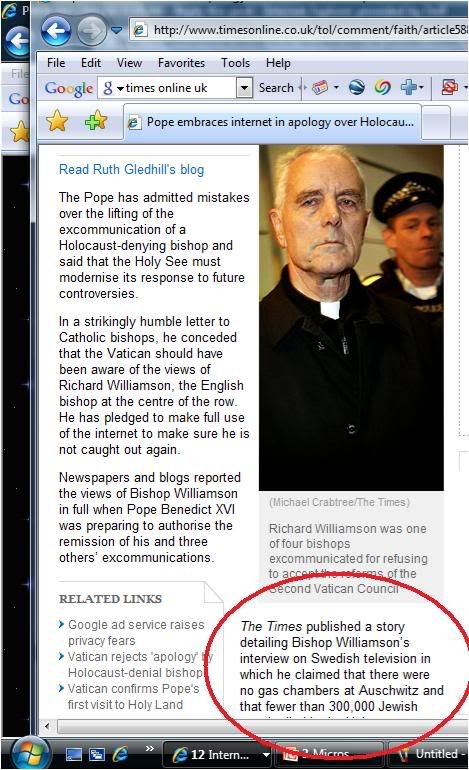 The Times published a story detailing Bishop Williamson’s interview on Swedish television in which he claimed that there were no gas chambers at Auschwitz and that fewer than 300,000 Jewish people died in the Holocaust instead of the true figure of six million
The Times published a story detailing Bishop Williamson’s interview on Swedish television in which he claimed that there were no gas chambers at Auschwitz and that fewer than 300,000 Jewish people died in the Holocaust instead of the true figure of six million. [A LIE! They did not. Look at this paragraph on their online version (encircled in red on the illustration. Do you see a hyperlink on the words "Times' or 'story'? NO! If there really was a story, they would surely have shown the link. What instead did they have?
Here is the result for an online search of the Times alone for its articles about Bishop Richard Williamson before January 21, sorted from the newest story down:
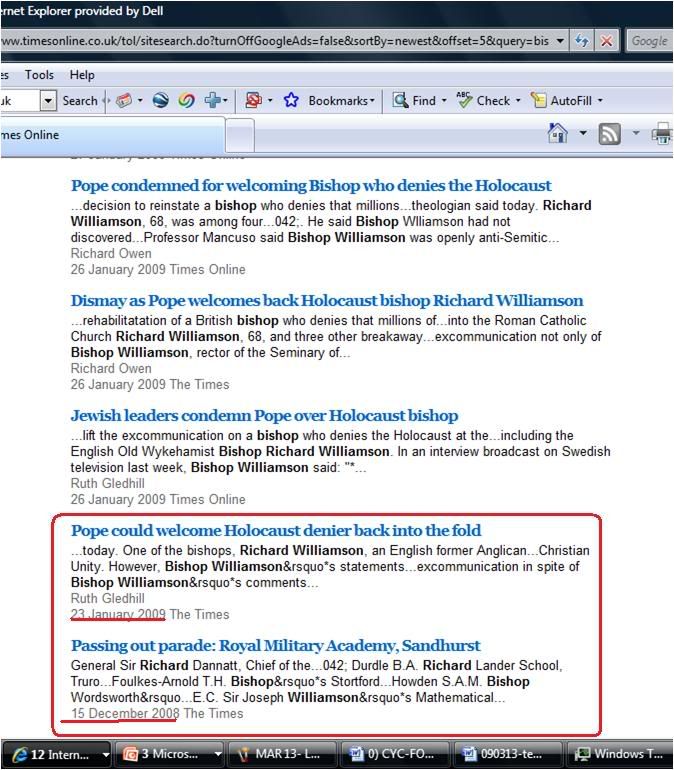
As you can see, the first report with Richard Williamson is January 23, 2009. Before that - there was no richard Williamson as such. except combinations of stories where both Richard and Williamson appear. TRY THE SEARCH YOURSELF... and you will get pages and pages of items in which 'Richard' and 'Williamson' appear in the same article, but no 'Bishop Richard Williamson'... I went as far as 2003 and when I still could nto find a 'Bishop Richard Williamson' article, I stopped. Benedict became Pope in April 2005, after all.
OK, Next I searched through Ruth Gledhill's blogs.[ And here is her first mention of Richard Williamson. What is the date? JANUARY 21, 2009 - after Tornielli and Rodari [the sources cited by RORATE CAELI] had reported that the decree was about to be made public.
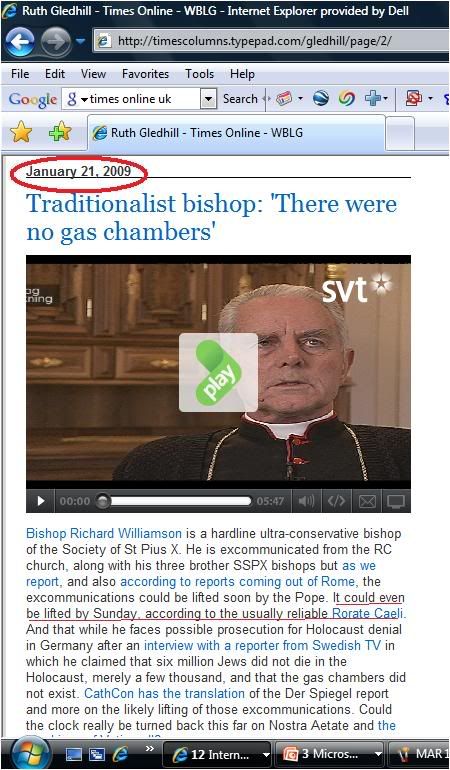 ] ]
Now, tell me if Owens and Gledhill were not passing off a BIG LIE in their March 12 story where they try to make it appear - read the following line of the story below - that it is the Pope and his cardinals who must be lying that they did not know - because the Times had published stories about Williamson long before the fact!]
After the Holy See was engulfed by protest, the Pope and his cardinals claimed that they had not known of Bishop Williamson’s views or the interview.
He wrote to all bishops yesterday admitting how mistakes had allowed a gesture that had been intended to further Christian unity to be misrepresented. He pledged to make the Holy See more aware of how useful the internet could be.
The Pope, who is due to visit Israel, described the affair as an unforeseeable mishap and thanked Jewish leaders for helping to defuse it. He said his action in lifting the excommunications was a considerate act of mercy toward prelates who had not been legitimately ordained.
The four, including Bishop Williamson, were ordained by Archbishop Marcel Lefebvre, founder of the arch-conservative Society of St Pius X, who was excommunicated for refusing to accept the reforms of the Second Vatican Council.
The letter’s full text will be issued today, when the Pope is due to receive a delegation of rabbis in a resumption of a dialogue suspended by the Israeli side because of the affair.
*********************************************************************
I am truly shocked that journalists with supposed 'reputation' like Owen and Gledhill would tell such barefaced lies when they can easily be found out through the Internet. They must be convinced none of their readers is bound to check them out - and that makes their lying even more reprehensible!
I did due diligence on Williamson after the fact, just to see what I might have found out if I had googled him before January 21 - and I reported on that exercise last February 20 in NOTABLES:
freeforumzone.leonardo.it/discussione.aspx?idd=355175&p=28
The Internet is a great thing, but you only get from it what is put into it, first of all. And hardly anyone was putting anything about Richard Williamson into the Web before January 21, so dear Holy Father, even in this matter, you have been misled.
The concerned Curial dicasteries should still do their homework the proper old-fashioned way, especially about background-checking candidates for bishop who may not have any trace on the Internet at all!
By the way, I did check out Gledhill's references - and beyond, because her main reference, Cathcon, is a secondary source, that does cite its own source, The Remnant, which had the following information on January 21, from January 20 reports:
www.remnantnewspaper.com/Archives/2009-williamson_to_be_cha...
As for the Spiegel article, which the Remnant post refers to, it is found in the January 19 issue of the weekly newsmagazine - I do not know what day it comes out on news-stands, but apparently, those 'in the know' had earlier access online to the German article, which was the linchpin of the 'conspiracy' unearthed in the Vatican dossier post-1/21/09.
[Modificato da TERESA BENEDETTA 13/03/2009 23:59] |
 14/03/2009 00:49 14/03/2009 00:49 |
|
| | | OFFLINE | Post: 3.671 | Registrato il: 23/11/2005
| Utente Master | |
|
Pope Admits Online News Can Provide Infallible Aid
By RACHEL DONADIO
The New York Times
March 13, 2009
MADRID — The letter released Thursday in which Pope Benedict XVI admitted that the Vatican had made “mistakes” in handling the case of a Holocaust-denying bishop was unprecedented in its directness, its humanity and its acknowledgment of papal fallibility.
But it also contained two sentences unique in the annals of church history.
“I have been told that consulting the information available on the Internet would have made it possible to perceive the problem early on,” Benedict wrote. “I have learned the lesson that in the future in the Holy See we will have to pay greater attention to that source of news.”
In other words: “Note to the Roman Curia: try Google.”
The Vatican, a 2,000-year-old monarchy built on the ruins of the Roman Empire and run by octogenarians, has officially recognized the demands of the 24-hour news cycle, not a 24-century one.
In his disarmingly human letter, Benedict acknowledged the “avalanche of protests” elicited after he revoked the excommunication of four schismatic bishops in January, including Richard Williamson, who in a television interview broadcast a few days earlier — and widely available online — had denied the existence of the Nazi gas chambers.
In the ensuing weeks, the pope said he had not been aware of Bishop Williamson’s views at the time he revoked the excommunication, and he repeatedly condemned anti-Semitism.
But the criticism did not stop, as Catholics and Jews alike questioned the pope’s moral authority.
The pope said in the letter that he was “saddened” that even Catholics “thought they had to attack me with open hostility,” and he thanked “our Jewish friends, who quickly helped to clear up the misunderstanding and to restore the atmosphere of friendship and trust.”
Benedict met with a delegation of the Chief Rabbinate of Israel at the Vatican on Thursday and is expected to make his first papal visit to the Holy Land in May.
Speaking to reporters at the Vatican on Thursday, the Vatican spokesman, the Rev. Federico Lombardi, said Benedict had taken the criticism to heart. “He demonstrates that he was touched and that he listened to what was said, even on the Internet,” Father Lombardi said.
In a column last week, John L. Allen Jr. of The National Catholic Reporter noted that Benedict, a master at the question-and-answer format, recently responded to a question about whether clerics needed more real-world experience by saying, “We don’t live on the moon.”
In his letter, the pope also defended his decision to revoke the excommunications of the bishops, who belong to the ultraconservative Society of St. Pius X, founded in opposition to the liberalizing reforms of the Second Vatican Council of the mid-1960s.
They had been excommunicated by Pope John Paul II in 1988 after being consecrated without a papal mandate.
“That the quiet gesture of extending a hand gave rise to a huge uproar, and thus became exactly the opposite of a gesture of reconciliation, is a fact which we must accept,” Benedict wrote.
“But I ask now: Was it, and is it, truly wrong in this case to meet halfway the brother who ‘has something against you’ and to seek reconciliation?” he added, citing Scripture.
He also said that the group must accept the teachings of Vatican II. “The church’s teaching authority cannot be frozen in the year 1962 — this must be quite clear to the Society,” he wrote.
On Thursday, the Society of St. Pius X said it was ready to begin the doctrinal debates necessary for its return to full communion with the church. It conveyed the news in an e-mail message, in Latin, which instructed recipients “Ite ed vide,” or go and look, at its Web site, of course.
Elisabetta Povoledo contributed reporting from Vatican City.
|
|
|
|
|